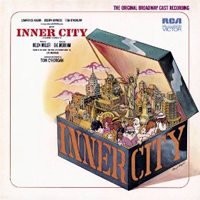 Original Broadway Cast, 1971 (RCA/Masterworks Broadway)
Original Broadway Cast, 1971 (RCA/Masterworks Broadway)  (4 / 5) Perhaps the source material was too obscure for audiences to really understand this show, which only ran on Broadway for 97 performances (and 24 previews). What poet Eve Merriam originally wrote was Inner City Mother Goose, a new take on nursery rhymes from an urban, sometimes violent perspective. So the familiar “Fee Fi Fo Fum” was followed by the less-expected “I smell the blood of violence to come,” while “Now I lay me down to sleep” was followed by “and I pray the double lock will keep.” Helen Miller set the poems to theatrical rock music. Most of them last a minute or less, but they’re memorable minutes. In “Hushabye Baby,” an unwed teenager sings about the child she’ll soon have, and it sounds like something that Brecht and Weill might have written had they been around in the early 1970s. Other highlights include “On This Rock,” a statement of urban pride; the jaunty “City Life”; and the pulsating “Law and Order,” which the TV series of the same title should have used as its theme song. “Deep in the Night” and “It’s My Belief” are solid anthems that helped win Linda Hopkins a Tony Award as Best Featured Actress. Then there’s “The Hooker,” in which a prostitute sings, “If they want to hear a story, then I give out with a story…I need ten dollars for grandma, who is coughing and spitting up blood. But whaddaya say we cut the crap?” The same socko melody is used for both “The Pusher” and “The Pickpocket,” but that last one didn’t make the album. That’s all right, we should be very grateful that this short-running show yielded a cast recording at all. — Peter Filichia
(4 / 5) Perhaps the source material was too obscure for audiences to really understand this show, which only ran on Broadway for 97 performances (and 24 previews). What poet Eve Merriam originally wrote was Inner City Mother Goose, a new take on nursery rhymes from an urban, sometimes violent perspective. So the familiar “Fee Fi Fo Fum” was followed by the less-expected “I smell the blood of violence to come,” while “Now I lay me down to sleep” was followed by “and I pray the double lock will keep.” Helen Miller set the poems to theatrical rock music. Most of them last a minute or less, but they’re memorable minutes. In “Hushabye Baby,” an unwed teenager sings about the child she’ll soon have, and it sounds like something that Brecht and Weill might have written had they been around in the early 1970s. Other highlights include “On This Rock,” a statement of urban pride; the jaunty “City Life”; and the pulsating “Law and Order,” which the TV series of the same title should have used as its theme song. “Deep in the Night” and “It’s My Belief” are solid anthems that helped win Linda Hopkins a Tony Award as Best Featured Actress. Then there’s “The Hooker,” in which a prostitute sings, “If they want to hear a story, then I give out with a story…I need ten dollars for grandma, who is coughing and spitting up blood. But whaddaya say we cut the crap?” The same socko melody is used for both “The Pusher” and “The Pickpocket,” but that last one didn’t make the album. That’s all right, we should be very grateful that this short-running show yielded a cast recording at all. — Peter Filichia
Category Archives: G-I
Hadestown
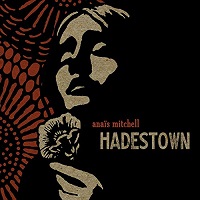 Studio Cast, 2010 (Wilderland Records)
Studio Cast, 2010 (Wilderland Records)  (3 / 5) Though indie singer/songwriter Anaïs Mitchell always meant for Hadestown to be a stage musical, its first incarnation was in the form of this concept album, recorded for posterity and to give the piece greater audience outreach. The response was overwhelmingly strong, and Hadestown grew a dedicated fan base over the years until a production opened at the New York Theatre Workshop in 2016, followed by the show’s Broadway premiere in 2019. Considering the immediately intense response from fans, it’s surprising now to hear how simplistic this album is; compared to other concept albums that became stage musicals (Evita, for example), this one is a much more relaxed affair. Based on the Greek myth of Orpheus, who travels to the Underworld (“Hadestown”) to bring back his love Eurydice, the piece as heard on this recording is a fairly straightforward retelling of the myth and is mostly a platform for Mitchell’s talents as a songwriter. Her music can groove festively (“Way Down in Hadestown,” “When the Chips Are Down”) or float dreamlike (“Wedding Song,” “Wait For Me”), always with an edgy undercurrent that foreshadows the danger lying ahead. Mitchell’s lyrics are poetically expressive, though they become sharper and more story-driven on the later cast albums. Here, Mitchell herself sings the role of Eurydice, while Justin Vernon performs Orpheus. An odd choice is made in the mixing of the latter’s vocals, so that it sounds like multiple Vernons are singing together each time Orpheus is present. (According to the myth, Orpheus possessed a mystically beautiful singing voice, and the mixing may have been meant to reflect that, but the effect is off-putting.) Those who were unfamiliar with Hadestown until it came to Broadway and who desire to hear its origins will find this album mostly engaging, but subsequent recordings of the score are superior and, of course, more indicative of what the piece eventually became. — Matt Koplik
(3 / 5) Though indie singer/songwriter Anaïs Mitchell always meant for Hadestown to be a stage musical, its first incarnation was in the form of this concept album, recorded for posterity and to give the piece greater audience outreach. The response was overwhelmingly strong, and Hadestown grew a dedicated fan base over the years until a production opened at the New York Theatre Workshop in 2016, followed by the show’s Broadway premiere in 2019. Considering the immediately intense response from fans, it’s surprising now to hear how simplistic this album is; compared to other concept albums that became stage musicals (Evita, for example), this one is a much more relaxed affair. Based on the Greek myth of Orpheus, who travels to the Underworld (“Hadestown”) to bring back his love Eurydice, the piece as heard on this recording is a fairly straightforward retelling of the myth and is mostly a platform for Mitchell’s talents as a songwriter. Her music can groove festively (“Way Down in Hadestown,” “When the Chips Are Down”) or float dreamlike (“Wedding Song,” “Wait For Me”), always with an edgy undercurrent that foreshadows the danger lying ahead. Mitchell’s lyrics are poetically expressive, though they become sharper and more story-driven on the later cast albums. Here, Mitchell herself sings the role of Eurydice, while Justin Vernon performs Orpheus. An odd choice is made in the mixing of the latter’s vocals, so that it sounds like multiple Vernons are singing together each time Orpheus is present. (According to the myth, Orpheus possessed a mystically beautiful singing voice, and the mixing may have been meant to reflect that, but the effect is off-putting.) Those who were unfamiliar with Hadestown until it came to Broadway and who desire to hear its origins will find this album mostly engaging, but subsequent recordings of the score are superior and, of course, more indicative of what the piece eventually became. — Matt Koplik
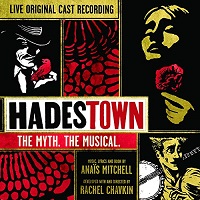 Original Off-Broadway Cast, 2017 (Warner Classics)
Original Off-Broadway Cast, 2017 (Warner Classics)  (4 / 5) Recorded live at the New York Theatre Workshop, this album has high-energy performances and a number of welcome changes to Hadestown since its original incarnation. The biggest change is that the the piece as heard here is no longer so straightforward a re-telling of the Orpheus and Eurydice myth, but builds upon it by expanding characters that didn’t have much presence on the original recording and giving them more active roles. These include the messenger god Hermes (Chris Sullivan), who now narrates the proceedings. A trio of actresses called The Fates are more fully present as a Greek Chorus, and the story of Hades (a quietly domineering Patrick Page) and his wife, Persephone (Amber Grey), is explored with greater depth here, showing us how their marriage, once passionate but now cold, has detrimentally effected the characters on earth. These changes make Hadestown a more fulfilling and well rounded piece, but they also create a new problem: Mitchell has written the supporting characters with a hard edge and a playful attitude, whereas her songs for Orpheus and Eurydice have a more earnest romanticism. On a surface level, this makes sense, as the young pair are meant to be the heart of the piece. But in giving the supporting characters such rich, lively material, Mitchell has made them more interesting than the two leads. It doesn’t help that several of Orpheus and Eurydice’s songs included in the NYTW production are inexplicably not on the album. (“Wedding Song” is a major loss). Considering all of this, Damon Daunno and Nabiyah Be do admirable work as the doomed lovers. In fact, Daunno, is perhaps the best Orpheus heard on any of the official Hadestown recordings; he gives the character a confident, passionate swagger, and his voice sails smoothly through Mitchell’s score, seamlessly gliding in and out of a pure falsetto. Generally speaking, what’s presented on this recording is so well done that it almost makes up for the material that isn’t included. Fan favorites from the concept album, such as Orpheus’ “Wait for Me” or Hades’ scarily relevant “Why We Build the Wall,” are still here, but Mitchell’s additions are also worth noting: Persephone is given the jaunty “Livin it Up On Top,” gracefully vamped by Grey, and Hermes begins the show with a new opening number, “Road to Hell.” From the moment a trombone wails a jazzy, New Orleans-fueled intro to that song (orchestraters Michael Chorney and Todd Sickafoose continue from the concept album), you know that the energy of Hadestown has shifted from relaxed mysticism to hot theatricality. It’s a welcome change. — M.K.
(4 / 5) Recorded live at the New York Theatre Workshop, this album has high-energy performances and a number of welcome changes to Hadestown since its original incarnation. The biggest change is that the the piece as heard here is no longer so straightforward a re-telling of the Orpheus and Eurydice myth, but builds upon it by expanding characters that didn’t have much presence on the original recording and giving them more active roles. These include the messenger god Hermes (Chris Sullivan), who now narrates the proceedings. A trio of actresses called The Fates are more fully present as a Greek Chorus, and the story of Hades (a quietly domineering Patrick Page) and his wife, Persephone (Amber Grey), is explored with greater depth here, showing us how their marriage, once passionate but now cold, has detrimentally effected the characters on earth. These changes make Hadestown a more fulfilling and well rounded piece, but they also create a new problem: Mitchell has written the supporting characters with a hard edge and a playful attitude, whereas her songs for Orpheus and Eurydice have a more earnest romanticism. On a surface level, this makes sense, as the young pair are meant to be the heart of the piece. But in giving the supporting characters such rich, lively material, Mitchell has made them more interesting than the two leads. It doesn’t help that several of Orpheus and Eurydice’s songs included in the NYTW production are inexplicably not on the album. (“Wedding Song” is a major loss). Considering all of this, Damon Daunno and Nabiyah Be do admirable work as the doomed lovers. In fact, Daunno, is perhaps the best Orpheus heard on any of the official Hadestown recordings; he gives the character a confident, passionate swagger, and his voice sails smoothly through Mitchell’s score, seamlessly gliding in and out of a pure falsetto. Generally speaking, what’s presented on this recording is so well done that it almost makes up for the material that isn’t included. Fan favorites from the concept album, such as Orpheus’ “Wait for Me” or Hades’ scarily relevant “Why We Build the Wall,” are still here, but Mitchell’s additions are also worth noting: Persephone is given the jaunty “Livin it Up On Top,” gracefully vamped by Grey, and Hermes begins the show with a new opening number, “Road to Hell.” From the moment a trombone wails a jazzy, New Orleans-fueled intro to that song (orchestraters Michael Chorney and Todd Sickafoose continue from the concept album), you know that the energy of Hadestown has shifted from relaxed mysticism to hot theatricality. It’s a welcome change. — M.K.
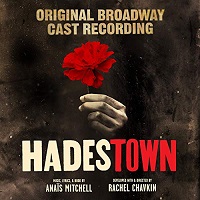 Original Broadway Cast, 2019 (Sing It Again Records)
Original Broadway Cast, 2019 (Sing It Again Records)  (5 / 5) After the workshop production at NYTW, Hadestown was staged in Canada and at the Royal National Theatre in London, where it continued to develop until it finally came to Broadway nearly a decade after the release of the concept album. On stage, the result is often breathtaking, with Mitchell’s score embracing its theatrical potential and director Rachel Chavkin and her team of designers working visual wonders. Some have complained that, in turning Hadestown into a full evening of theater, Mitchell overstuffed the piece with unnecessary material. There’s a certain amount of truth there, in that, when the show is experienced live on stage, some numbers feel less important than others and/or seem to reiterate points made previously. But when one is listening to the cast recording, all of those complaints melt away, and we’re left with Mitchell’s fantastic work sung by a phenomenal company. Grey and Page are back as Persephone and Hades, with André de Shields offering a wiser and kinder Hermes than his predecessors. Eva Noblezada is a passionately sung Eurydice; her performance, and the addition of “Any Way the Wind Blows” (an already established song of Mitchell’s), give the character some much needed grit. Reeve Carney’s interpretation of Orpheus is more of a wandering man-child than the swaggering heartthrob offered by Daunno; this is a valid choice, although it does rob the character’s romantic pairing with Eurydice of some heat. Also, while Carney has a strong voice and does well by the material, his singing is not quite as smooth and effortless as Daunno’s. Still, these are small quibbles about what is overall a terrific album. One of its major highlights is “Wait for Me,” Orpheus’ cry to Eurydice as he travels to the Underworld to save her. While the song was moving and pretty on the concept album, Mitchell, Chorney and Sickafoose here have shaped it into something spectacularly theatrical. And, speaking of waiting: Fans of Hadestown had to wait almost 10 years for the piece to become a completely satisfying stage musical, but their patience has been well rewarded. — M.K.
(5 / 5) After the workshop production at NYTW, Hadestown was staged in Canada and at the Royal National Theatre in London, where it continued to develop until it finally came to Broadway nearly a decade after the release of the concept album. On stage, the result is often breathtaking, with Mitchell’s score embracing its theatrical potential and director Rachel Chavkin and her team of designers working visual wonders. Some have complained that, in turning Hadestown into a full evening of theater, Mitchell overstuffed the piece with unnecessary material. There’s a certain amount of truth there, in that, when the show is experienced live on stage, some numbers feel less important than others and/or seem to reiterate points made previously. But when one is listening to the cast recording, all of those complaints melt away, and we’re left with Mitchell’s fantastic work sung by a phenomenal company. Grey and Page are back as Persephone and Hades, with André de Shields offering a wiser and kinder Hermes than his predecessors. Eva Noblezada is a passionately sung Eurydice; her performance, and the addition of “Any Way the Wind Blows” (an already established song of Mitchell’s), give the character some much needed grit. Reeve Carney’s interpretation of Orpheus is more of a wandering man-child than the swaggering heartthrob offered by Daunno; this is a valid choice, although it does rob the character’s romantic pairing with Eurydice of some heat. Also, while Carney has a strong voice and does well by the material, his singing is not quite as smooth and effortless as Daunno’s. Still, these are small quibbles about what is overall a terrific album. One of its major highlights is “Wait for Me,” Orpheus’ cry to Eurydice as he travels to the Underworld to save her. While the song was moving and pretty on the concept album, Mitchell, Chorney and Sickafoose here have shaped it into something spectacularly theatrical. And, speaking of waiting: Fans of Hadestown had to wait almost 10 years for the piece to become a completely satisfying stage musical, but their patience has been well rewarded. — M.K.
 London Cast, 2024 (Sing it Again Records)
London Cast, 2024 (Sing it Again Records)  (3.5 / 5) Hadestown first hit the London stage in a limited engagement at the National Theatre in 2018, as part of its pre-Broadway tryout. Due to the show’s massive success since then, it returned to the West End in 2024, resulting in this album, recorded live at the Lyric Theatre. As an addition to the Hadestown discography, it does have a few demerits. First, and most importantly, what’s presented here is not the entire score; songs such as “Any Way the Wind Blows” and “Hey Little Songbird” are missing, not to mention the first half of the second act. Next, because this recording is live, listeners who are used to the clear, pristine sound of the Broadway album will have a harder time catching the details of the orchestrations. Finally, while Dónal Finn makes for a smoldering Orpheus, his voice — particularly his falsetto — is less mellifluous than those of his predecessors, making some of the quieter moments of his songs sound a bit uncomfortable for him. Still, even with these caveats, this might be the most highly energetic and passionate recording of Anaïs Mitchell’s score yet. Melanie La Barrie’s Hermes kicks things off to a rousing start with “Road to Hell,” and that level of energy continues through the entire performance. Finn is well matched by Grace Hodgett Young’s tough-as-nails Eurydice; their rendition of the “Wedding Song” is particularly steamy. Zachary James’ Hades is appropriately menacing, and Gloria Onitiri makes such a strong impression as Persephone that it’s all the more disheartening not to have “Our Lady of the Underground” included here. If this album had offered the entirety of Mitchell’s score, it could’ve rivaled the original Broadway cast recording. As it stands, it serves as an exciting and fun companion to it. –– M.K.
(3.5 / 5) Hadestown first hit the London stage in a limited engagement at the National Theatre in 2018, as part of its pre-Broadway tryout. Due to the show’s massive success since then, it returned to the West End in 2024, resulting in this album, recorded live at the Lyric Theatre. As an addition to the Hadestown discography, it does have a few demerits. First, and most importantly, what’s presented here is not the entire score; songs such as “Any Way the Wind Blows” and “Hey Little Songbird” are missing, not to mention the first half of the second act. Next, because this recording is live, listeners who are used to the clear, pristine sound of the Broadway album will have a harder time catching the details of the orchestrations. Finally, while Dónal Finn makes for a smoldering Orpheus, his voice — particularly his falsetto — is less mellifluous than those of his predecessors, making some of the quieter moments of his songs sound a bit uncomfortable for him. Still, even with these caveats, this might be the most highly energetic and passionate recording of Anaïs Mitchell’s score yet. Melanie La Barrie’s Hermes kicks things off to a rousing start with “Road to Hell,” and that level of energy continues through the entire performance. Finn is well matched by Grace Hodgett Young’s tough-as-nails Eurydice; their rendition of the “Wedding Song” is particularly steamy. Zachary James’ Hades is appropriately menacing, and Gloria Onitiri makes such a strong impression as Persephone that it’s all the more disheartening not to have “Our Lady of the Underground” included here. If this album had offered the entirety of Mitchell’s score, it could’ve rivaled the original Broadway cast recording. As it stands, it serves as an exciting and fun companion to it. –– M.K.
In Transit
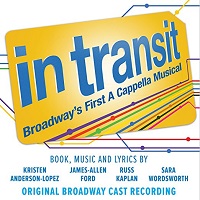 Original Broadway Cast, 2017 (Hollywood Records)
Original Broadway Cast, 2017 (Hollywood Records)  (2 / 5) One wants to applaud In Transit, Broadway’s first a cappella musical, about the semi-connected lives of a small group of New Yorkers played out within and around the subway system. The cast is enthusiastic; the vocal harmonies, arranged by Pitch Perfect’s Deke Sharon, are amazing; Steven “HeaveN” Cantor and Chesney Snow, alternating as beatbox performer Boxman, are percussive wizards; and there are happy endings for the characters. “But, ya know, whatever,” as someone in the show says at one point. The score never really gels, although the writers — Kristen Anderson-Lopez, James-Allen Ford, Russ Kaplan, and Sara Wordsworth — try to convince us that it’s not the destination, it’s the journey that matters most. Journeying “Deep Beneath the City” are Jane (Margo Seibert), slaving in a office while her Broadway dreams fade; her agent, Trent (Justin Guarini), who’s preparing to marry Steven (Telly Leung), although he hasn’t even told his fundamentalist Momma (Moya Angela) that he’s gay; Trent’s friend, Ali (Erin Mackey), newly dumped by her boyfriend; and Ali’s brother, Nate (James Snyder), unemployed and attracted to Jane. (Boxman doesn’t commute. He has found his calling as a subway guru. )Jane’s story arc, while clichéd, comes off best. “Do What I Do” will resonate with anyone stuck in a survival job, and Seibert nails “Getting There,” taking Boxman’s advice to heart. The gay love story is genuine, if bland. Family conflict is set up in the country-flavored “Four Days Home,” and Guarini conveys Trent’s pain when he realizes Momma is deliberately “Choosing Not to Know.” Mackey gets the ultimate 21s-century list song, “Saturday Night Obsession,” cyber-stalking her ex to hilarious comments from the back-ups. In addition to her moments as Momma, Angela unleashes her belt as grumpy subway both clerk Althea and as Jane’s boss. Her sardonic “A Little Friendly Advice” is one of the score’s strongest numbers. But, as a dramatic whole, In Transit would have benefited from more depth of story than a metaphor told in a few vignettes. — Laura Frankos
(2 / 5) One wants to applaud In Transit, Broadway’s first a cappella musical, about the semi-connected lives of a small group of New Yorkers played out within and around the subway system. The cast is enthusiastic; the vocal harmonies, arranged by Pitch Perfect’s Deke Sharon, are amazing; Steven “HeaveN” Cantor and Chesney Snow, alternating as beatbox performer Boxman, are percussive wizards; and there are happy endings for the characters. “But, ya know, whatever,” as someone in the show says at one point. The score never really gels, although the writers — Kristen Anderson-Lopez, James-Allen Ford, Russ Kaplan, and Sara Wordsworth — try to convince us that it’s not the destination, it’s the journey that matters most. Journeying “Deep Beneath the City” are Jane (Margo Seibert), slaving in a office while her Broadway dreams fade; her agent, Trent (Justin Guarini), who’s preparing to marry Steven (Telly Leung), although he hasn’t even told his fundamentalist Momma (Moya Angela) that he’s gay; Trent’s friend, Ali (Erin Mackey), newly dumped by her boyfriend; and Ali’s brother, Nate (James Snyder), unemployed and attracted to Jane. (Boxman doesn’t commute. He has found his calling as a subway guru. )Jane’s story arc, while clichéd, comes off best. “Do What I Do” will resonate with anyone stuck in a survival job, and Seibert nails “Getting There,” taking Boxman’s advice to heart. The gay love story is genuine, if bland. Family conflict is set up in the country-flavored “Four Days Home,” and Guarini conveys Trent’s pain when he realizes Momma is deliberately “Choosing Not to Know.” Mackey gets the ultimate 21s-century list song, “Saturday Night Obsession,” cyber-stalking her ex to hilarious comments from the back-ups. In addition to her moments as Momma, Angela unleashes her belt as grumpy subway both clerk Althea and as Jane’s boss. Her sardonic “A Little Friendly Advice” is one of the score’s strongest numbers. But, as a dramatic whole, In Transit would have benefited from more depth of story than a metaphor told in a few vignettes. — Laura Frankos
Groundhog Day
 Original Broadway Cast, 2017 (Masterworks Broadway/Broadway Records)
Original Broadway Cast, 2017 (Masterworks Broadway/Broadway Records)  (4 / 5) After the immense artistic and commercial success of Matilda, Tim Minchin turned his efforts next towards adapting the beloved comedic film Groundhog Day, working with the film’s screenwriter, Danny Rubin. The central character is the egotistical, misogynistic weatherman Phil Connors (Bill Murray in the movie), who finds himself stuck living February 2nd over and over again in the small town of Punxsutawney. Rather than attempt to slavishly recreate the film’s most famous moments, Rubin and Minchin delved into the source material and truly adapted it to give us an endlessly inventive and rewarding musical with a perfect leading performance by Andy Karl. Hilariously smug at the start, Karl believably navigates Phil’s journey from narcissist to humanist, all the while staying well outside of Murray’s large shadow. Minchin’s score is not quite as tightly crafted as his score for Matilda, but it’s more experimental in terms of structure and style, and is ultimately a more mature work. Of course, Minchin still allows himself some fun shock humor with the cheeky “Stuck” and the hillbilly hoedown “Nobody Cares,” but these songs are just facets of a multidimensional score that never feels disjointed, partly thanks to Christopher Nightingale’s astute orchestrations. If the cast recording has one fault, it’s the surprising lack of dialogue included here. Not every Broadway album needs to offer dialogue to be successful (see, for example, the original Oklahoma! or A Little Night Music), but given how important director Matthew Warchus’s staging was to the storytelling of the original production, the lack of context makes tracks like “Philandering” and “Hope” lose some of their comedic edge. On the other hand, the small amount of dialogue we do hear on the album allows Groundhog Day to show its heart. The uplifting “If I Had My Time Again” is not just catchy but is also deceptively moving in its optimism, as Phil’s producer Rita (an endearing Barrett Doss) convinces him that this endless cycle he’s in is actually a gift. And when the two finally connect in the show’s finale “Seeing You,” listeners may be surprised to find themselves so moved by a score that earlier rhymed “toxins” with “constipated oxens.” But that’s musical theater for you. — Matt Koplik
(4 / 5) After the immense artistic and commercial success of Matilda, Tim Minchin turned his efforts next towards adapting the beloved comedic film Groundhog Day, working with the film’s screenwriter, Danny Rubin. The central character is the egotistical, misogynistic weatherman Phil Connors (Bill Murray in the movie), who finds himself stuck living February 2nd over and over again in the small town of Punxsutawney. Rather than attempt to slavishly recreate the film’s most famous moments, Rubin and Minchin delved into the source material and truly adapted it to give us an endlessly inventive and rewarding musical with a perfect leading performance by Andy Karl. Hilariously smug at the start, Karl believably navigates Phil’s journey from narcissist to humanist, all the while staying well outside of Murray’s large shadow. Minchin’s score is not quite as tightly crafted as his score for Matilda, but it’s more experimental in terms of structure and style, and is ultimately a more mature work. Of course, Minchin still allows himself some fun shock humor with the cheeky “Stuck” and the hillbilly hoedown “Nobody Cares,” but these songs are just facets of a multidimensional score that never feels disjointed, partly thanks to Christopher Nightingale’s astute orchestrations. If the cast recording has one fault, it’s the surprising lack of dialogue included here. Not every Broadway album needs to offer dialogue to be successful (see, for example, the original Oklahoma! or A Little Night Music), but given how important director Matthew Warchus’s staging was to the storytelling of the original production, the lack of context makes tracks like “Philandering” and “Hope” lose some of their comedic edge. On the other hand, the small amount of dialogue we do hear on the album allows Groundhog Day to show its heart. The uplifting “If I Had My Time Again” is not just catchy but is also deceptively moving in its optimism, as Phil’s producer Rita (an endearing Barrett Doss) convinces him that this endless cycle he’s in is actually a gift. And when the two finally connect in the show’s finale “Seeing You,” listeners may be surprised to find themselves so moved by a score that earlier rhymed “toxins” with “constipated oxens.” But that’s musical theater for you. — Matt Koplik
Holiday Inn, The New Irving Berlin Musical
 Original Broadway Cast, 2016 (Ghostlight)
Original Broadway Cast, 2016 (Ghostlight)  (2 / 5) In 1939, Irving Berlin imagined a themed revue set at an inn that opens only on holidays, with songs highlighting seasonal celebrations. It didn’t make it to the stage, but the idea became the basis for the 1942 film Holiday Inn, starring Bing Crosby and Fred Astaire, and featuring the biggest-selling song in history, “White Christmas.” Success breeds success, so the inn setting, Crosby, and that song reappeared in the 1954 film White Christmas. Both movies became perennial holiday offerings on television, prompting theatrical adaptations. Berlin himself recycled songs like aluminum cans; the original Holiday Inn lifted “Easter Parade” and “Blue Skies” from earlier shows. In similar fashion, librettists Gordon Greenberg (who also directed) and Chad Hodge ransacked Berlin’s catalog for gems to shoehorn into the plot of the stage version. The nine interpolated songs sometimes work (“Shaking the Blues Away” as an obvious cheer-up number) and sometimes don’t (“Heat Wave” sounds out of place, “Cheek to Cheek” is sadly truncated). Three songs from the film were cut: “Lazy,” replaced by “The Little Things In Life,” a more satisfactory “I want” song for Jim Hardy, along with the Presidential tributes “I Can’t Tell a Lie” and the minstrelsy “Abraham.” The plot largely follows that of the movie, with nightclub performers Jim (Bryce Pinkham), his girlfriend Lila (Megan Sikora), their pal Ted (Corbin Bleu), and Connecticut gal Linda (Lora Lee Gayer) variously torn between their desires for show biz, settling down, and each other. Pinkham gives Jim an earnestness (“Blue Skies,” “It’s a Lovely Day Today”) that distances him from Crosby’s laid back portrayal. He wisely keeps “White Christmas” simple, with Gayer delicately joining him. The latter conveys Linda’s sweetness in “Nothing More to Say,” one of the lesser-known tunes. In contrast, Sikora’s Lila is sometimes just too brassy, and the talented Megan Lawrence is wasted here, squeaking weirdly on the title song. Bleu ably handles the production numbers, including the literally explosive “Let’s Say It With Firecrackers,” but he doesn’t have much of a character to develop. Larry Blank’s exuberant orchestrations generally fit the material, but there are some odd changes in tempo during “Cheek to Cheek,” and “Easter Parade” sounds lethargic. — Laura Frankos
(2 / 5) In 1939, Irving Berlin imagined a themed revue set at an inn that opens only on holidays, with songs highlighting seasonal celebrations. It didn’t make it to the stage, but the idea became the basis for the 1942 film Holiday Inn, starring Bing Crosby and Fred Astaire, and featuring the biggest-selling song in history, “White Christmas.” Success breeds success, so the inn setting, Crosby, and that song reappeared in the 1954 film White Christmas. Both movies became perennial holiday offerings on television, prompting theatrical adaptations. Berlin himself recycled songs like aluminum cans; the original Holiday Inn lifted “Easter Parade” and “Blue Skies” from earlier shows. In similar fashion, librettists Gordon Greenberg (who also directed) and Chad Hodge ransacked Berlin’s catalog for gems to shoehorn into the plot of the stage version. The nine interpolated songs sometimes work (“Shaking the Blues Away” as an obvious cheer-up number) and sometimes don’t (“Heat Wave” sounds out of place, “Cheek to Cheek” is sadly truncated). Three songs from the film were cut: “Lazy,” replaced by “The Little Things In Life,” a more satisfactory “I want” song for Jim Hardy, along with the Presidential tributes “I Can’t Tell a Lie” and the minstrelsy “Abraham.” The plot largely follows that of the movie, with nightclub performers Jim (Bryce Pinkham), his girlfriend Lila (Megan Sikora), their pal Ted (Corbin Bleu), and Connecticut gal Linda (Lora Lee Gayer) variously torn between their desires for show biz, settling down, and each other. Pinkham gives Jim an earnestness (“Blue Skies,” “It’s a Lovely Day Today”) that distances him from Crosby’s laid back portrayal. He wisely keeps “White Christmas” simple, with Gayer delicately joining him. The latter conveys Linda’s sweetness in “Nothing More to Say,” one of the lesser-known tunes. In contrast, Sikora’s Lila is sometimes just too brassy, and the talented Megan Lawrence is wasted here, squeaking weirdly on the title song. Bleu ably handles the production numbers, including the literally explosive “Let’s Say It With Firecrackers,” but he doesn’t have much of a character to develop. Larry Blank’s exuberant orchestrations generally fit the material, but there are some odd changes in tempo during “Cheek to Cheek,” and “Easter Parade” sounds lethargic. — Laura Frankos
Irving Berlin’s White Christmas
 Premiere Recording, 2006 (Ghostlight)
Premiere Recording, 2006 (Ghostlight)  (3 / 5) Librettists David Ives and Paul Blake based this Irving Berlin songfest on the 1954 film of the same title, which starred Bing Crosby and Danny Kaye as ex-G.I.s, now performers, saving their former general’s failing Vermont farmhouse by — what else? — putting on a show. Ives and Blake altered some characters and eliminated four songs (“Heat Wave,” “Gee, I Wish I Were Back in the Army,” that unfortunate minstrel medley, and the campy “Choreography”) while adding eight Berlin classics. These numbers are better integrated into this show than those used in the later Irving Berlin’s Holiday Inn; pairing 1933’s “How Deep Is the Ocean?” with “Love, You Didn’t Do Right By Me” is particularly effective. “Happy Holiday” provides a quick jump from 1944 to 1954, and “Falling Out of Love Can Be Fun,” lifted from 1949’s Miss Liberty, is a kicky piece for the three women. “Love and the Weather” and “I’ve Got My Love to Keep Me Warm” also fit well, and the former gives some character insights. “Let Yourself Go,” however, has a mid-thirties vibe doesn’t sound quite right for a mid-fifties setting. White Christmas debuted at the St. Louis Muny in 2000, followed by a production in 2004 in San Francisco and a Broadway holiday run in 2008. This recording features the San Francisco leads — Brian d’Arcy James and Jeffry Denman as Bob and Phil, with Anastasia Barzee and Meredith Patterson as their girls, sisters Betty and Judy — plus Muny original Karen Morrow as Martha, the general’s aide. It’s a pleasure to hear d’Arcy James’s rich baritone in classics such as the title tune, “Blue Skies,” “Count Your Blessings,” and“How Deep Is the Ocean?” Barzee’s versatility is apparent; she’s wistful in “Love, You Didn’t Do Right By Me,” crackling with Patterson in the Andrews Sisters-styled “Sisters,” and tender in the reprise of “How Deep.” Patterson and Denman have a lot of fun in “Snow” and the tap extravaganza “I Love A Piano.” (The latter was written in 1915, but it’s timeless.) Morrow instills comic zest into the old Al Jolson hit “Let Me Sing and I’m Happy,” revealing Martha’s desire to perform, yet she manages not to become a caricature. The recording benefits from a sizable orchestra led by Rob Berman, with Larry Blank’s orchestrations intentionally sounding like a fifties movie musical. A solid choice for Berlin fans or those seeking something for their holiday playlist. — Laura Frankos
(3 / 5) Librettists David Ives and Paul Blake based this Irving Berlin songfest on the 1954 film of the same title, which starred Bing Crosby and Danny Kaye as ex-G.I.s, now performers, saving their former general’s failing Vermont farmhouse by — what else? — putting on a show. Ives and Blake altered some characters and eliminated four songs (“Heat Wave,” “Gee, I Wish I Were Back in the Army,” that unfortunate minstrel medley, and the campy “Choreography”) while adding eight Berlin classics. These numbers are better integrated into this show than those used in the later Irving Berlin’s Holiday Inn; pairing 1933’s “How Deep Is the Ocean?” with “Love, You Didn’t Do Right By Me” is particularly effective. “Happy Holiday” provides a quick jump from 1944 to 1954, and “Falling Out of Love Can Be Fun,” lifted from 1949’s Miss Liberty, is a kicky piece for the three women. “Love and the Weather” and “I’ve Got My Love to Keep Me Warm” also fit well, and the former gives some character insights. “Let Yourself Go,” however, has a mid-thirties vibe doesn’t sound quite right for a mid-fifties setting. White Christmas debuted at the St. Louis Muny in 2000, followed by a production in 2004 in San Francisco and a Broadway holiday run in 2008. This recording features the San Francisco leads — Brian d’Arcy James and Jeffry Denman as Bob and Phil, with Anastasia Barzee and Meredith Patterson as their girls, sisters Betty and Judy — plus Muny original Karen Morrow as Martha, the general’s aide. It’s a pleasure to hear d’Arcy James’s rich baritone in classics such as the title tune, “Blue Skies,” “Count Your Blessings,” and“How Deep Is the Ocean?” Barzee’s versatility is apparent; she’s wistful in “Love, You Didn’t Do Right By Me,” crackling with Patterson in the Andrews Sisters-styled “Sisters,” and tender in the reprise of “How Deep.” Patterson and Denman have a lot of fun in “Snow” and the tap extravaganza “I Love A Piano.” (The latter was written in 1915, but it’s timeless.) Morrow instills comic zest into the old Al Jolson hit “Let Me Sing and I’m Happy,” revealing Martha’s desire to perform, yet she manages not to become a caricature. The recording benefits from a sizable orchestra led by Rob Berman, with Larry Blank’s orchestrations intentionally sounding like a fifties movie musical. A solid choice for Berlin fans or those seeking something for their holiday playlist. — Laura Frankos
It Shoulda Been You
 Original Broadway Cast, 2015 (Ghostlight)
Original Broadway Cast, 2015 (Ghostlight)  (2 / 5) Weddings have inspired musicals since at least as early as the 1920s (often with multiple couples overcoming ridiculous obstacles before tying the knot) up through Fiddler on the Roof, Mamma Mia! and The Drowsy Chaperone (which parodied those ’20s shows). The combination of romance, mishaps, family conflict, and celebration is irresistible to writers. It Shoulda Been You joined the list in 2015, having originated as composer Barbara Anselmi’s concept piece at the BMI Lehman Engel Musical Theatre Workshop. Brian Hargrove came on as librettist/lyricist, though five of the workshop lyricists also retained credits; unfortunately, their lyrics vary in quality and are dissimilar in style from Hargrove’s work. Anselmi’s music, while not especially memorable, is sprightly enough, with occasional jazz overtones. Doug Besterman’s orchestrations provide that brassy, old-fashioned musical comedy feel. The cast is comprised of killer comic talent: Tyne Daly as the overbearing Jewish mother, Chip Zien as her husband, Sierra Boggess as the bride, Lisa Howard as the older sister who is in many ways the show’s central character, Harriet Harris as the unhappy mother of the groom, Josh Grisetti as the bride’s ex-boyfriend, and Edward Hibbert as the wedding planner. Plus, any show that has Montego Glover in a throwaway role has star power to spare. There are a few solid character numbers here: the sisters’ relationship is revealed in “Perfect”, Harris as the groom’s mom mourns the loss of her son to marriage in “Where Did I Go Wrong?”, and Howard and Grisetti conjure up childhood memories (“Who Was Angel to My Buffy?”) in “Who?” Daly gets a heartfelt 11 o’clocker in “What They Never Tell You,” and naturally, everyone is reconciled by the finale. So why does the score as heard on the cast recording seem nearly as flat as champagne opened last night? Probably because the show plays like an extended skit from The Carol Burnett Show, moving methodically from situation to situation, punctuated with a running gag about panini stations. “Albert’s Turn,” performed by Hibbert, largely serves to set up a later joke, while “Jenny’s Blues,” sung by Howard, is a textbook declaration of independence, and an ’80s power ballad sung by Glover and Nick Spangler is just pointless. (Spangler replaced David Burtka as the groom during the show’s brief Broadway run.) The comedy all-stars push to nail each joke, but they’re still playing stale stereotypes. Finally, It Shoulda Been You’s nuptial conditions and revelations rival the “ridiculous” factor of those ’20s shows, though in a 21st century social context. Musical comedy fans can accept all kinds of preposterous scenarios, but when practically the entire wedding party is hiding something, that’s harder to swallow than an overstuffed panini. — Laura Frankos
(2 / 5) Weddings have inspired musicals since at least as early as the 1920s (often with multiple couples overcoming ridiculous obstacles before tying the knot) up through Fiddler on the Roof, Mamma Mia! and The Drowsy Chaperone (which parodied those ’20s shows). The combination of romance, mishaps, family conflict, and celebration is irresistible to writers. It Shoulda Been You joined the list in 2015, having originated as composer Barbara Anselmi’s concept piece at the BMI Lehman Engel Musical Theatre Workshop. Brian Hargrove came on as librettist/lyricist, though five of the workshop lyricists also retained credits; unfortunately, their lyrics vary in quality and are dissimilar in style from Hargrove’s work. Anselmi’s music, while not especially memorable, is sprightly enough, with occasional jazz overtones. Doug Besterman’s orchestrations provide that brassy, old-fashioned musical comedy feel. The cast is comprised of killer comic talent: Tyne Daly as the overbearing Jewish mother, Chip Zien as her husband, Sierra Boggess as the bride, Lisa Howard as the older sister who is in many ways the show’s central character, Harriet Harris as the unhappy mother of the groom, Josh Grisetti as the bride’s ex-boyfriend, and Edward Hibbert as the wedding planner. Plus, any show that has Montego Glover in a throwaway role has star power to spare. There are a few solid character numbers here: the sisters’ relationship is revealed in “Perfect”, Harris as the groom’s mom mourns the loss of her son to marriage in “Where Did I Go Wrong?”, and Howard and Grisetti conjure up childhood memories (“Who Was Angel to My Buffy?”) in “Who?” Daly gets a heartfelt 11 o’clocker in “What They Never Tell You,” and naturally, everyone is reconciled by the finale. So why does the score as heard on the cast recording seem nearly as flat as champagne opened last night? Probably because the show plays like an extended skit from The Carol Burnett Show, moving methodically from situation to situation, punctuated with a running gag about panini stations. “Albert’s Turn,” performed by Hibbert, largely serves to set up a later joke, while “Jenny’s Blues,” sung by Howard, is a textbook declaration of independence, and an ’80s power ballad sung by Glover and Nick Spangler is just pointless. (Spangler replaced David Burtka as the groom during the show’s brief Broadway run.) The comedy all-stars push to nail each joke, but they’re still playing stale stereotypes. Finally, It Shoulda Been You’s nuptial conditions and revelations rival the “ridiculous” factor of those ’20s shows, though in a 21st century social context. Musical comedy fans can accept all kinds of preposterous scenarios, but when practically the entire wedding party is hiding something, that’s harder to swallow than an overstuffed panini. — Laura Frankos
Giant
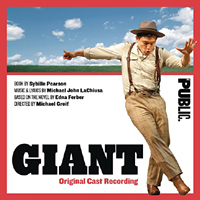 Original Off-Broadway Cast, 2013 (Ghostlight)
Original Off-Broadway Cast, 2013 (Ghostlight)  (4 / 5) Texas is big. Edna Ferber’s 1952 novel, Giant, is big, spanning decades and two generations of rancher families. The 1956 movie version is big, with spurting oils wells and thundering cattle herds (plus a stunning young Liz Taylor and a sultry James Dean). How to translate something so gigantic to the stage? By going big with the score. Giant may not be Michael John LaChiusa’s most important musical, but it’s his most melodic, alternately sweeping and introspective. This recording is jam-packed with 26 songs from the three-hour show: Mexican folk songs, country hoedowns, ballads of hope and regret, swing, and early rock. (LaChiusa subtly mirrors changing musical tastes as the story moves from 1925 to 1952.) Linking the various parts of the whole is the anthem “Heartbreak Country,” for at its heart, Giant is the tale of that land — the Reata Ranch — and how it changed through the years, affecting everyone connected with it. At the center is the owner, Bick Benedict (the wonderful Brian D’Arcy James), who, like his older sister Luz (Michele Pawk), loves Reata and is always aware of his obligation to “take care of the land.” Yet, instead of marrying the daughter of a neighboring ranch owner, he weds an educated Virginian, Leslie (Kate Baldwin). LaChiusa chronicles their relationship in nine telling numbers. “Your Texas” is about Leslie’s dreams during their courtship, including a kind of frontier utopia. The lilting “Did Spring Come To Texas?” reveals Bick’s joy at their wedding. Things don’t always run smoothly, not with Luz’s interference and sexy mechanic Jett (PJ Griffith) hanging around; but there is genuine love here, and Bick and Lesie try repeatedly to work out their differences (“Heartbreak Country,” “Topsy Turvy”). A major issue is the treatment of the Mexicans who work the ranch, once Mexican property (“Aurelia Dolores”). The racism appalls Leslie, and her views are shared by the couple’s bookish son, Jordy (Bobby Steggart), who loves Juana (Natalie Cortez). Things reach a crisis in the climactic “The Desert,” a musical sequence (with dialogue by librettist Sybille Pearson) that’s a mini-play in itself. Others — there are nearly a dozen significant characters — play their roles in this changing Texas. Griffith works hard to distance himself from Dean’s iconic portrayal; his rock growl helps. Pawk’s Luz is perhaps overly villainous in “No Time For Surprises,” but fares better in her duets with Bick. John Dossett and Katie Thompson each get strong solos as Bick’s uncle and the girl Bick jilted for Leslie. The younger generation — Steggert, Cortez, Miguel Cervantes, and Mackenzie Mauzy — have their own chances to shine as well, notably in the bouncy “Jump” and the tender “There Is A Child.” This is a rich, vibrant score, loaded with emotion and power. — Laura Frankos
(4 / 5) Texas is big. Edna Ferber’s 1952 novel, Giant, is big, spanning decades and two generations of rancher families. The 1956 movie version is big, with spurting oils wells and thundering cattle herds (plus a stunning young Liz Taylor and a sultry James Dean). How to translate something so gigantic to the stage? By going big with the score. Giant may not be Michael John LaChiusa’s most important musical, but it’s his most melodic, alternately sweeping and introspective. This recording is jam-packed with 26 songs from the three-hour show: Mexican folk songs, country hoedowns, ballads of hope and regret, swing, and early rock. (LaChiusa subtly mirrors changing musical tastes as the story moves from 1925 to 1952.) Linking the various parts of the whole is the anthem “Heartbreak Country,” for at its heart, Giant is the tale of that land — the Reata Ranch — and how it changed through the years, affecting everyone connected with it. At the center is the owner, Bick Benedict (the wonderful Brian D’Arcy James), who, like his older sister Luz (Michele Pawk), loves Reata and is always aware of his obligation to “take care of the land.” Yet, instead of marrying the daughter of a neighboring ranch owner, he weds an educated Virginian, Leslie (Kate Baldwin). LaChiusa chronicles their relationship in nine telling numbers. “Your Texas” is about Leslie’s dreams during their courtship, including a kind of frontier utopia. The lilting “Did Spring Come To Texas?” reveals Bick’s joy at their wedding. Things don’t always run smoothly, not with Luz’s interference and sexy mechanic Jett (PJ Griffith) hanging around; but there is genuine love here, and Bick and Lesie try repeatedly to work out their differences (“Heartbreak Country,” “Topsy Turvy”). A major issue is the treatment of the Mexicans who work the ranch, once Mexican property (“Aurelia Dolores”). The racism appalls Leslie, and her views are shared by the couple’s bookish son, Jordy (Bobby Steggart), who loves Juana (Natalie Cortez). Things reach a crisis in the climactic “The Desert,” a musical sequence (with dialogue by librettist Sybille Pearson) that’s a mini-play in itself. Others — there are nearly a dozen significant characters — play their roles in this changing Texas. Griffith works hard to distance himself from Dean’s iconic portrayal; his rock growl helps. Pawk’s Luz is perhaps overly villainous in “No Time For Surprises,” but fares better in her duets with Bick. John Dossett and Katie Thompson each get strong solos as Bick’s uncle and the girl Bick jilted for Leslie. The younger generation — Steggert, Cortez, Miguel Cervantes, and Mackenzie Mauzy — have their own chances to shine as well, notably in the bouncy “Jump” and the tender “There Is A Child.” This is a rich, vibrant score, loaded with emotion and power. — Laura Frankos
A Gentleman’s Guide to Love and Murder
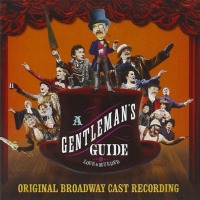 Original Broadway Cast, 2014 (Ghostlight)
Original Broadway Cast, 2014 (Ghostlight)  (3 / 5) Based on a novel by Roy Horniman that also inspired the film Kind Hearts and Coronets (1949), A Gentleman’s Guide to Love and Murder is pure wit and charm, but at a slight cost. The musical tells of an English Everyman, Monty Navarro, who discovers that he’s an heir to the prestigious D’Ysquith family’s fortune and then schemes to bump off each member of the family who stands in the line of succession before him. Though this may sound like nasty stuff, songwriters Robert L Freedman and Steven Lutvak present the story in a highly affected, proper-British, light-operetta manner: Agatha Christie meets Gilbert and Sullivan meets Oscar Wilde. They succeeded in making a fun and clever musical, one for which Lutvak composed many hummable melodies and, with Freedman, some exceptionally witty lyrics. Yet the cast album is a bit of a slow burn for the listener; early songs such as “You’re a D’ysquith” and “Foolish to Think” demonstrate Lutvak and Freedman’s difficulty in creating a strong narrative structure for much of the show’s first act. But as Monty (here played with dewy innocence by Bryce Pinkham) gains more confidence with his schemes, so does the show, and by the time we get to the door-slamming farce “I’ve Decided to Marry You” in Act Two, A Gentleman’s Guide to Love and Murder has risen from commendably intelligent to wonderfully hilarious. The recording boasts a stellar cast: Pinkham glides easily through the score with his silken voice, Lisa O’Hare is perfect as the shallow Sibella, and Lauren Worsham brings operatic flair to the role of the goodhearted Phoebe. Best of all is Jefferson Mays, clearly having a ball playing all eight moribund members of the D’Ysquith family. (This device was carried over from Kind Hearts and Coronets, in which Alec Guinness plays the victims.) With sophisticated yet daffy orchestrations by Jonathan Tunick to boot, this album offers a great deal of fun to any musical theater fan who’s willing to put in the time and listen through to the end. — Matt Koplik
(3 / 5) Based on a novel by Roy Horniman that also inspired the film Kind Hearts and Coronets (1949), A Gentleman’s Guide to Love and Murder is pure wit and charm, but at a slight cost. The musical tells of an English Everyman, Monty Navarro, who discovers that he’s an heir to the prestigious D’Ysquith family’s fortune and then schemes to bump off each member of the family who stands in the line of succession before him. Though this may sound like nasty stuff, songwriters Robert L Freedman and Steven Lutvak present the story in a highly affected, proper-British, light-operetta manner: Agatha Christie meets Gilbert and Sullivan meets Oscar Wilde. They succeeded in making a fun and clever musical, one for which Lutvak composed many hummable melodies and, with Freedman, some exceptionally witty lyrics. Yet the cast album is a bit of a slow burn for the listener; early songs such as “You’re a D’ysquith” and “Foolish to Think” demonstrate Lutvak and Freedman’s difficulty in creating a strong narrative structure for much of the show’s first act. But as Monty (here played with dewy innocence by Bryce Pinkham) gains more confidence with his schemes, so does the show, and by the time we get to the door-slamming farce “I’ve Decided to Marry You” in Act Two, A Gentleman’s Guide to Love and Murder has risen from commendably intelligent to wonderfully hilarious. The recording boasts a stellar cast: Pinkham glides easily through the score with his silken voice, Lisa O’Hare is perfect as the shallow Sibella, and Lauren Worsham brings operatic flair to the role of the goodhearted Phoebe. Best of all is Jefferson Mays, clearly having a ball playing all eight moribund members of the D’Ysquith family. (This device was carried over from Kind Hearts and Coronets, in which Alec Guinness plays the victims.) With sophisticated yet daffy orchestrations by Jonathan Tunick to boot, this album offers a great deal of fun to any musical theater fan who’s willing to put in the time and listen through to the end. — Matt KoplikIn the Heights
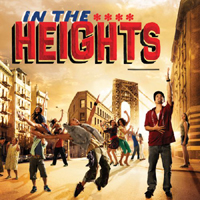 Original Broadway Cast, 2008 (Ghostlight, 2CDs)
Original Broadway Cast, 2008 (Ghostlight, 2CDs)  (4 / 5) Winner of 2008 Tony Awards for Best Musical, Best Original Score, and Best Orchestrations, In the Heights was the first Broadway musical hit to use rap as an essential storytelling component in a score that blends Latin musical styles with hip-hop sensibilities. Set in the Latin-American community of Manhattan’s Washington Heights, the show nestles sentimental stories of first- and second-generation immigrants pursuing their various American dreams and romances amid larger themes concerning notions of home and gentrification. The Grammy Award winning cast album, a two-disc set, preserves the entirety of a dynamic score with both music and lyrics by Lin-Manuel Miranda, who also conceived the show and played the leading role of bodega-owner Usnavi. Fueled by high-octane horns and propulsive percussion, the passion-filled orchestrations by Alex Lacamoire and Bill Sherman support Miranda’s dramatic rapping and the superb singing of the other leads. If you don’t like salsa, merengue, Latin jazz, and hip-hop, you’re out of luck here; but even if the score overall is somewhat lacking in variety, the lengthy individual numbers are built of different-sounding sections. They mix diverse styles, tempi, rhythms, instruments, dynamic levels, and vocal qualities (both spoken and sung), constituting variegated musical journeys unto themselves. Most of the songs also integrate lots of funny, interestingly detailed, and/or emotionally touching dialogue, lending a potent theatricality to what is essentially a pop-music score. Album highlights include “When You’re Home,” a snappy duet performed by Mandy Gonzalez and Christopher Jackson as the show’s young lovers, Nina and Benny; the tear-jerkers “Everything I Know” and “Inutil,” gorgeously sung by Gonzalez and Carlos Gomez, respectively; “Benny’s Dispatch,” a rhythmic treat; and the exciting ensemble number “Carnaval del Barrio.” — Lisa Jo Sagolla
(4 / 5) Winner of 2008 Tony Awards for Best Musical, Best Original Score, and Best Orchestrations, In the Heights was the first Broadway musical hit to use rap as an essential storytelling component in a score that blends Latin musical styles with hip-hop sensibilities. Set in the Latin-American community of Manhattan’s Washington Heights, the show nestles sentimental stories of first- and second-generation immigrants pursuing their various American dreams and romances amid larger themes concerning notions of home and gentrification. The Grammy Award winning cast album, a two-disc set, preserves the entirety of a dynamic score with both music and lyrics by Lin-Manuel Miranda, who also conceived the show and played the leading role of bodega-owner Usnavi. Fueled by high-octane horns and propulsive percussion, the passion-filled orchestrations by Alex Lacamoire and Bill Sherman support Miranda’s dramatic rapping and the superb singing of the other leads. If you don’t like salsa, merengue, Latin jazz, and hip-hop, you’re out of luck here; but even if the score overall is somewhat lacking in variety, the lengthy individual numbers are built of different-sounding sections. They mix diverse styles, tempi, rhythms, instruments, dynamic levels, and vocal qualities (both spoken and sung), constituting variegated musical journeys unto themselves. Most of the songs also integrate lots of funny, interestingly detailed, and/or emotionally touching dialogue, lending a potent theatricality to what is essentially a pop-music score. Album highlights include “When You’re Home,” a snappy duet performed by Mandy Gonzalez and Christopher Jackson as the show’s young lovers, Nina and Benny; the tear-jerkers “Everything I Know” and “Inutil,” gorgeously sung by Gonzalez and Carlos Gomez, respectively; “Benny’s Dispatch,” a rhythmic treat; and the exciting ensemble number “Carnaval del Barrio.” — Lisa Jo Sagolla
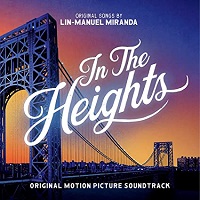 Original Motion Picture Soundtrack, 2021 (Atlantic)
Original Motion Picture Soundtrack, 2021 (Atlantic)  (4 / 5) Retaining the Broadway show’s heart-warming plot lines, likable characters, and Lin-Manuel Miranda’s infectious rap and Latin-pop score, the movie adaptation of In the Heights shifts the focus of the musical’s exploration of “home” from the inter-personal dynamics of a family unit to the larger sense of community shared within their urban neighborhood. The film excises six of the show’s bittersweet, family-related and character-developing solos and duets, and evolves most of the remaining songs into huge production numbers that fill the screen with hordes of dancing bodies. The resulting soundtrack album is, thus, an invigorating collection of mostly upbeat, similarly structured tracks of pop music that may launch quietly but build into full-blown ensemble excitement. Produced by Miranda, Alex Lacamoire, Bill Sherman, and Greg Wells, these percussion-heavy tracks often strike an imperfect balance, volume-wise, between vocals and instrumentals. Unlike the original cast album, with its bright Broadway voices bursting out amid lots of brassy punctuation, here we have thinner pop-style singing competing with louder, fuller orchestrations. One often wishes the words were easier to discern, as the soundtrack CD’s accompanying booklet provides no lyrics. Though shorter than the Broadway recording by about 30 minutes, the soundtrack album contains one newly-written song by Miranda, “Home All Summer.” Featuring the singing of Latin-music superstar Marc Anthony, it exudes a Latin dance-club sensibility as it plays over the film’s closing credits. The soundtrack outshines the Broadway album on two tracks: “The Club,” with electrifying instrumental dance breaks arranged by Oscar Hernández; and “When the Sun Goes Down,” its shimmering orchestrations enriching the ballad’s romantic qualities. Otherwise, one’s choice of the more satisfying album may depend largely on whether one prefers Miranda’s bitingly rhythmic, musically exhilarating rapping or the less-stylized, emotion-laden delivery of Anthony Ramos, who in the film portrays the leading role of Usnavi, created onstage by Miranda. In the climactic “Finale” on the Broadway recording Miranda’s rapping thrills with sharp, spine-tingling musicality, while on the soundtrack, Ramos’s more actorly approach makes one genuinely feel the musical’s celebratory message. — Lisa Jo Sagolla
(4 / 5) Retaining the Broadway show’s heart-warming plot lines, likable characters, and Lin-Manuel Miranda’s infectious rap and Latin-pop score, the movie adaptation of In the Heights shifts the focus of the musical’s exploration of “home” from the inter-personal dynamics of a family unit to the larger sense of community shared within their urban neighborhood. The film excises six of the show’s bittersweet, family-related and character-developing solos and duets, and evolves most of the remaining songs into huge production numbers that fill the screen with hordes of dancing bodies. The resulting soundtrack album is, thus, an invigorating collection of mostly upbeat, similarly structured tracks of pop music that may launch quietly but build into full-blown ensemble excitement. Produced by Miranda, Alex Lacamoire, Bill Sherman, and Greg Wells, these percussion-heavy tracks often strike an imperfect balance, volume-wise, between vocals and instrumentals. Unlike the original cast album, with its bright Broadway voices bursting out amid lots of brassy punctuation, here we have thinner pop-style singing competing with louder, fuller orchestrations. One often wishes the words were easier to discern, as the soundtrack CD’s accompanying booklet provides no lyrics. Though shorter than the Broadway recording by about 30 minutes, the soundtrack album contains one newly-written song by Miranda, “Home All Summer.” Featuring the singing of Latin-music superstar Marc Anthony, it exudes a Latin dance-club sensibility as it plays over the film’s closing credits. The soundtrack outshines the Broadway album on two tracks: “The Club,” with electrifying instrumental dance breaks arranged by Oscar Hernández; and “When the Sun Goes Down,” its shimmering orchestrations enriching the ballad’s romantic qualities. Otherwise, one’s choice of the more satisfying album may depend largely on whether one prefers Miranda’s bitingly rhythmic, musically exhilarating rapping or the less-stylized, emotion-laden delivery of Anthony Ramos, who in the film portrays the leading role of Usnavi, created onstage by Miranda. In the climactic “Finale” on the Broadway recording Miranda’s rapping thrills with sharp, spine-tingling musicality, while on the soundtrack, Ramos’s more actorly approach makes one genuinely feel the musical’s celebratory message. — Lisa Jo Sagolla
Grey Gardens
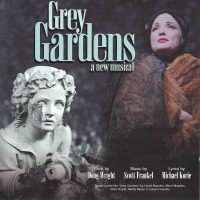 Original Off-Broadway Cast, 2006 (PS Classics)
Original Off-Broadway Cast, 2006 (PS Classics)  (3 / 5) Based on Albert and David Maysles’ fascinating 1975 documentary film of the same name, the musical Grey Gardens depicts the dysfunctional relationship between Edith Bouvier Beale and her daughter, Edie, and the shocking squalor into which they had descended by the mid-1970s. The aunt and cousin of Jacqueline Bouvier Kennedy Onassis, the eccentric, elderly Edith and 56-year-old Edie were discovered residing in a filthy Long Island mansion overrun with cats and wild raccoons. While the musical’s second act takes place in 1973 and replicates much of the film’s ghastly content, the first act is a fictionalized confluence of three real-life events that likely impelled the socialites’ downfall: Edith’s father rebuking her, Joe Kennedy, Jr. inexplicably breaking off his engagement to Edie, and Edith’s husband secretly running off to Mexico to obtain a divorce. Though Christine Ebersole gives a tour-de-force performance in the leading dual role (playing Edith in the first act, Edie in the second), and Doug Wright’s penetrating book is buttressed by well-crafted songs by Scott Frankel and Michael Korie, the original Off-Broadway cast album of Grey Gardens can make for difficult listening. Aside from “Another Winter in a Summer Town,” a poetic ballad, and “The Revolutionary Costume for Today,” an amusing illustration of Edie’s idiosyncratic sense of fashion, the score’s primary attractions are its pastiche evocations of once-popular song genres, ranging from minstrelsy to marches, jazz, soft-shoe, gospel, and those beloved waltz-songs commonly used in musicals as emblems of nostalgia. However, the album also preserves much of the songs’ internal and contextualizing dialogue, most of which is argumentative or otherwise unpleasant and therefore compromises the aesthetic appeal of the music. While it is a representative souvenir of the stage production, this is the kind of album likely to sit on one’s shelf. — Lisa Jo Sagolla
(3 / 5) Based on Albert and David Maysles’ fascinating 1975 documentary film of the same name, the musical Grey Gardens depicts the dysfunctional relationship between Edith Bouvier Beale and her daughter, Edie, and the shocking squalor into which they had descended by the mid-1970s. The aunt and cousin of Jacqueline Bouvier Kennedy Onassis, the eccentric, elderly Edith and 56-year-old Edie were discovered residing in a filthy Long Island mansion overrun with cats and wild raccoons. While the musical’s second act takes place in 1973 and replicates much of the film’s ghastly content, the first act is a fictionalized confluence of three real-life events that likely impelled the socialites’ downfall: Edith’s father rebuking her, Joe Kennedy, Jr. inexplicably breaking off his engagement to Edie, and Edith’s husband secretly running off to Mexico to obtain a divorce. Though Christine Ebersole gives a tour-de-force performance in the leading dual role (playing Edith in the first act, Edie in the second), and Doug Wright’s penetrating book is buttressed by well-crafted songs by Scott Frankel and Michael Korie, the original Off-Broadway cast album of Grey Gardens can make for difficult listening. Aside from “Another Winter in a Summer Town,” a poetic ballad, and “The Revolutionary Costume for Today,” an amusing illustration of Edie’s idiosyncratic sense of fashion, the score’s primary attractions are its pastiche evocations of once-popular song genres, ranging from minstrelsy to marches, jazz, soft-shoe, gospel, and those beloved waltz-songs commonly used in musicals as emblems of nostalgia. However, the album also preserves much of the songs’ internal and contextualizing dialogue, most of which is argumentative or otherwise unpleasant and therefore compromises the aesthetic appeal of the music. While it is a representative souvenir of the stage production, this is the kind of album likely to sit on one’s shelf. — Lisa Jo Sagolla
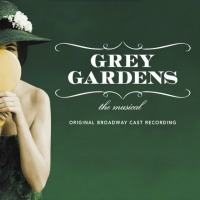 Original Broadway Cast, 2007 (PS Classics)
Original Broadway Cast, 2007 (PS Classics)  (5 / 5) Upon the opening of the Broadway production of Grey Gardens (and the release of the Broadway cast recording), the creative team deemed it the definitive version of their show and requested the discontinuation of the cast album of the original Off-Broadway production, turning that recording into a collector’s item. Considering the musical’s generally grim story about former First Lady Jackie Kennedy’s peculiar aunt and pitiful cousin, Edith and Edie, who wind up living in sickening seediness, the Broadway album is a surprisingly fun listen. In its revamping, the musical lost four of its least inspired songs and gained three shiny new ones. Whereas the Off-Broadway album opens with a scratchy old recording of Edith singing “Toyland” that gets drowned out by the mother and daughter bickering, the Broadway album launches with the newly written “The Girl Who Has Everything,” an optimistic tune set within a conversation of pleasant reminiscing. The new song “Goin’ Places,” sung by Edie and her boyfriend, Joe Kennedy, Jr. (before he jilts her), substitutes a showy jazz number with upbeat lyrics about Joe’s future for Off-Broadway’s “Better Fall Out of Love,” a downer emphasizing why Joe and Edie aren’t right for each other. While the plodding “Tomorrow’s Woman” from Off-Broadway was simply eliminated, the spirited march “Being Bouvier” was re-constituted as “Marry Well,” changing the song from a cold military man’s boasting to warmer-toned advice for young girls from a concerned grandpa. The album also benefits from sparkling new orchestrations by Bruce Coughlin; the only major casting change made for the Broadway transfer, namely the replacement of Sara Gettelfinger by the superior singer Erin Davie as Edie in the first act; and the trimming of the unsettling dialogue that weighed down the Off-Broadway recording, which makes it easier for us to appreciate the humorous aspects of the story of poor, pathetic Edith and Edie. — L.J.S.
(5 / 5) Upon the opening of the Broadway production of Grey Gardens (and the release of the Broadway cast recording), the creative team deemed it the definitive version of their show and requested the discontinuation of the cast album of the original Off-Broadway production, turning that recording into a collector’s item. Considering the musical’s generally grim story about former First Lady Jackie Kennedy’s peculiar aunt and pitiful cousin, Edith and Edie, who wind up living in sickening seediness, the Broadway album is a surprisingly fun listen. In its revamping, the musical lost four of its least inspired songs and gained three shiny new ones. Whereas the Off-Broadway album opens with a scratchy old recording of Edith singing “Toyland” that gets drowned out by the mother and daughter bickering, the Broadway album launches with the newly written “The Girl Who Has Everything,” an optimistic tune set within a conversation of pleasant reminiscing. The new song “Goin’ Places,” sung by Edie and her boyfriend, Joe Kennedy, Jr. (before he jilts her), substitutes a showy jazz number with upbeat lyrics about Joe’s future for Off-Broadway’s “Better Fall Out of Love,” a downer emphasizing why Joe and Edie aren’t right for each other. While the plodding “Tomorrow’s Woman” from Off-Broadway was simply eliminated, the spirited march “Being Bouvier” was re-constituted as “Marry Well,” changing the song from a cold military man’s boasting to warmer-toned advice for young girls from a concerned grandpa. The album also benefits from sparkling new orchestrations by Bruce Coughlin; the only major casting change made for the Broadway transfer, namely the replacement of Sara Gettelfinger by the superior singer Erin Davie as Edie in the first act; and the trimming of the unsettling dialogue that weighed down the Off-Broadway recording, which makes it easier for us to appreciate the humorous aspects of the story of poor, pathetic Edith and Edie. — L.J.S.
The Great Waltz
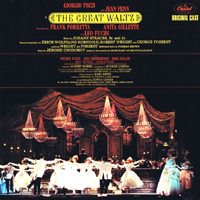 Original West Coast Cast, 1965 (Capitol/no CD)
Original West Coast Cast, 1965 (Capitol/no CD)  (4 / 5) Edwin Lester of the Civic Light Opera Company of Los Angeles and San Francisco was known for bringing Broadway’s first national tours to the West Coast, and for mounting revivals with as many original Broadway cast members as possible. He was also famous for creating and producing such successful “modern” operettas as Song of Norway and Kismet. This show began in Vienna in 1930 as an operetta (Walzer aus Wien) based on the lives and music of Johann Strauss Sr. and Jr. As The Great Waltz, it traveled abroad successfully, then opened on Broadway in a new version in 1934. The credits on this recording reveal the complicated history of the show: music by the two Strausses; musical adaptation by Erich Wolfgang Korngold, Robert Wright, and George Forrest; lyrics by Wright and Forrest; additional lyrics by Forman Brown; book by Jerome Chodorov, based on versions by Moss Hart (1934) and Milton Lazarus (1949). The book of the Lester version involves the father/son conflict that actually existed between Strausses père and fils. The melodies are, of course, ravishing, and the adaptations are scintillatingly orchestrated. Metropolitan Opera stars Giorgio Tozzi (as the elder Strauss) and Jean Fenn (as an opera singer who had a serious flirtation with Strauss in his youth) are wonderful in their respective introductory solos, “I’m in Love With Vienna” and “Philosophy of Life.” And when they raise their voices together in their duets “Of Men and Violins” and “The Enchanted Wood,” they are simply grand. The role of Strauss, Jr. is sung with ringing tenor tone by Frank Porretta; the character has no solos in The Great Waltz, but his duets with Fenn and with Anita Gillette in the ingénue role of Resi are thrilling. Gillette delightfully joins with Wilbur Evans (as Herr Dommayer) in the infectious “A Waltz With Wings.” There is also a fine quartet of conflict for the four principals, “No Two Ways”; a trio titled “Music,” performed with verve by Evans, Leo Fuchs, and Eric Brotherson; and the effective “Blue Danube” finale. — Jeffrey Dunn
(4 / 5) Edwin Lester of the Civic Light Opera Company of Los Angeles and San Francisco was known for bringing Broadway’s first national tours to the West Coast, and for mounting revivals with as many original Broadway cast members as possible. He was also famous for creating and producing such successful “modern” operettas as Song of Norway and Kismet. This show began in Vienna in 1930 as an operetta (Walzer aus Wien) based on the lives and music of Johann Strauss Sr. and Jr. As The Great Waltz, it traveled abroad successfully, then opened on Broadway in a new version in 1934. The credits on this recording reveal the complicated history of the show: music by the two Strausses; musical adaptation by Erich Wolfgang Korngold, Robert Wright, and George Forrest; lyrics by Wright and Forrest; additional lyrics by Forman Brown; book by Jerome Chodorov, based on versions by Moss Hart (1934) and Milton Lazarus (1949). The book of the Lester version involves the father/son conflict that actually existed between Strausses père and fils. The melodies are, of course, ravishing, and the adaptations are scintillatingly orchestrated. Metropolitan Opera stars Giorgio Tozzi (as the elder Strauss) and Jean Fenn (as an opera singer who had a serious flirtation with Strauss in his youth) are wonderful in their respective introductory solos, “I’m in Love With Vienna” and “Philosophy of Life.” And when they raise their voices together in their duets “Of Men and Violins” and “The Enchanted Wood,” they are simply grand. The role of Strauss, Jr. is sung with ringing tenor tone by Frank Porretta; the character has no solos in The Great Waltz, but his duets with Fenn and with Anita Gillette in the ingénue role of Resi are thrilling. Gillette delightfully joins with Wilbur Evans (as Herr Dommayer) in the infectious “A Waltz With Wings.” There is also a fine quartet of conflict for the four principals, “No Two Ways”; a trio titled “Music,” performed with verve by Evans, Leo Fuchs, and Eric Brotherson; and the effective “Blue Danube” finale. — Jeffrey Dunn
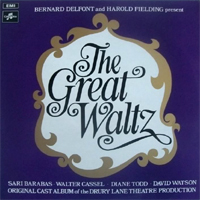 London Cast, 1970 (Columbia/no CD)
London Cast, 1970 (Columbia/no CD)  (2 / 5) Edwin Lester’s Waltz was the impetus for this production at London’s famous Theatre Royal, Drury Lane. With a few textual changes (Julius Bittner is added to the songwriting credits), it ran for 706 performances. The cast album features an overture that’s not included on the earlier recording, and there are other differences in the song stack. Sari Barabas, a genuine European operetta star, exudes Continental flair in a gorgeously sung, heavily accented “I’m in Love With Vienna,” and she could not possibly be more playful or charming in “Teeter-Totter Me” with the sturdy-voiced David Watson as Strauss, Jr. Watson also works well with the Resi of Diane Todd, whose soprano is fluttery yet attractive. As the elder Strauss, Walter Casell displays a huge, mature baritone of great authority. The quartet for the principals gets a little wild, but the finale has Todd and Barabas doing some lovely trilling of the famous “Blue Danube.” — J.D.
(2 / 5) Edwin Lester’s Waltz was the impetus for this production at London’s famous Theatre Royal, Drury Lane. With a few textual changes (Julius Bittner is added to the songwriting credits), it ran for 706 performances. The cast album features an overture that’s not included on the earlier recording, and there are other differences in the song stack. Sari Barabas, a genuine European operetta star, exudes Continental flair in a gorgeously sung, heavily accented “I’m in Love With Vienna,” and she could not possibly be more playful or charming in “Teeter-Totter Me” with the sturdy-voiced David Watson as Strauss, Jr. Watson also works well with the Resi of Diane Todd, whose soprano is fluttery yet attractive. As the elder Strauss, Walter Casell displays a huge, mature baritone of great authority. The quartet for the principals gets a little wild, but the finale has Todd and Barabas doing some lovely trilling of the famous “Blue Danube.” — J.D.
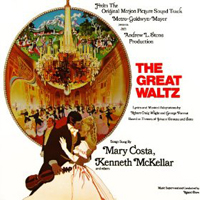 Film Soundtrack, 1972 (MGM/no CD)
Film Soundtrack, 1972 (MGM/no CD)  (4 / 5) Recorded in 1972, this is the soundtrack for a movie that was clearly out of step with the era in which it was created. Still, the film is a very pleasant and artful musical version of the life of Johann Strauss II. As in the other incarnations of The Great Waltz, it uses the melodies of Strauss but adds new lyrics by Wright and Forrest of Kismet and Song Of Norway fame. The big change here is that the lyrics are completely different from those created for the 1937 MGM movie and the 1965 Los Angeles Light Opera production. Many of the songs in the ’72 film were designed to actually narrate a biopic directed by the famously realistic Andrew Stone; others were created to utilize and exploit the singing talents of the beautiful opera star Mary Costa, best known as the voice of Sleeping Beauty in Disney’s animated film. In this way, the film manages to have a sturdy dramatic arc while adding great music and fantastic ballroom sequences choreographed by Onna White. The handsome German actor Horst Bucholz is well cast in the non-singing role of Strauss. The narrative songs here are effectively sung by tenor Kenneth McKellar, and all of the others are realistically presented as on-site performances. Wright & Forrest’s new songs have a greater maturity and sophistication than those heard in previous versions of The Great Waltz; operetta fans may well be enthralled by Costa’s renditions of “Who Are You?” and “Love Is Music.” There is also a small gem called “Say Oui, Say Ya, Say Yes” (performed by Joan Baxter), as lovely and seductive as any operetta number ever written. Sadly, this movie was made about 20 years too late, but today, it can be enjoyed for what it is: a golden example of operetta on film, and a thrilling Strauss cornucopia. The soundtrack album is a must for any operetta fan’s collection — if you can find it. The recording is now quite rare, as it was one of the last issued on the MGM records label as a vinyl LP and has never been released on CD or in any other digital format. — Gerard Alessandrini
(4 / 5) Recorded in 1972, this is the soundtrack for a movie that was clearly out of step with the era in which it was created. Still, the film is a very pleasant and artful musical version of the life of Johann Strauss II. As in the other incarnations of The Great Waltz, it uses the melodies of Strauss but adds new lyrics by Wright and Forrest of Kismet and Song Of Norway fame. The big change here is that the lyrics are completely different from those created for the 1937 MGM movie and the 1965 Los Angeles Light Opera production. Many of the songs in the ’72 film were designed to actually narrate a biopic directed by the famously realistic Andrew Stone; others were created to utilize and exploit the singing talents of the beautiful opera star Mary Costa, best known as the voice of Sleeping Beauty in Disney’s animated film. In this way, the film manages to have a sturdy dramatic arc while adding great music and fantastic ballroom sequences choreographed by Onna White. The handsome German actor Horst Bucholz is well cast in the non-singing role of Strauss. The narrative songs here are effectively sung by tenor Kenneth McKellar, and all of the others are realistically presented as on-site performances. Wright & Forrest’s new songs have a greater maturity and sophistication than those heard in previous versions of The Great Waltz; operetta fans may well be enthralled by Costa’s renditions of “Who Are You?” and “Love Is Music.” There is also a small gem called “Say Oui, Say Ya, Say Yes” (performed by Joan Baxter), as lovely and seductive as any operetta number ever written. Sadly, this movie was made about 20 years too late, but today, it can be enjoyed for what it is: a golden example of operetta on film, and a thrilling Strauss cornucopia. The soundtrack album is a must for any operetta fan’s collection — if you can find it. The recording is now quite rare, as it was one of the last issued on the MGM records label as a vinyl LP and has never been released on CD or in any other digital format. — Gerard Alessandrini
Heathers
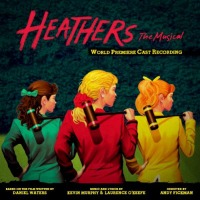 World Premiere Cast, 2014 (Yellow Sound Label)
World Premiere Cast, 2014 (Yellow Sound Label)  (2 / 5) Based on the ’80s cult film of the same title, Heathers is a musical that’s sometimes fun and frothy, though not particularly strong. Writers Laurence O’Keefe (Bat Boy, Legally Blonde) and Kevin Murphy (Reefer Madness) chose a broader, more cartoonish approach to the story than Kevin Waters’ acerbic, razor-sharp screenplay about two teenagers who go to drastic lengths to take down their high school’s hierarchy. While this treatment provides catchy music and a platform for the young, talented cast to display their vocal skills, it removes the bite that made the black-comedy movie so special. The light tone of songs such as “Candy Store” and “Big Fun” demonstrates that the show doesn’t intend to dig deep very often, and though some of the lyrics attempt to go for the film’s humorous shock value, they don’t ring as true as the screenplay’s now-classic dialogue. Only in the quieter moments, the ballads “Seventeen” and “Life Boat,” does the musical truly connect to the movie’s dark heart. As Veronica, originally played by Winona Ryder in the film, Barrett Wilbert Weed provides the most fully formed performance on the album; her dry line delivery and rock-tinged vocals are smart, specific, and thrilling. The orchestrations, by Ben Green and O’Keefe, capture the essence of the ’80s, even if the score mostly doesn’t. Those unfamiliar with the film will likely find this recording fun and entertaining, but hardcore Heathers fans may be disappointed that the chewing tobacco has been replaced by bubble gum. — Matt Koplik
(2 / 5) Based on the ’80s cult film of the same title, Heathers is a musical that’s sometimes fun and frothy, though not particularly strong. Writers Laurence O’Keefe (Bat Boy, Legally Blonde) and Kevin Murphy (Reefer Madness) chose a broader, more cartoonish approach to the story than Kevin Waters’ acerbic, razor-sharp screenplay about two teenagers who go to drastic lengths to take down their high school’s hierarchy. While this treatment provides catchy music and a platform for the young, talented cast to display their vocal skills, it removes the bite that made the black-comedy movie so special. The light tone of songs such as “Candy Store” and “Big Fun” demonstrates that the show doesn’t intend to dig deep very often, and though some of the lyrics attempt to go for the film’s humorous shock value, they don’t ring as true as the screenplay’s now-classic dialogue. Only in the quieter moments, the ballads “Seventeen” and “Life Boat,” does the musical truly connect to the movie’s dark heart. As Veronica, originally played by Winona Ryder in the film, Barrett Wilbert Weed provides the most fully formed performance on the album; her dry line delivery and rock-tinged vocals are smart, specific, and thrilling. The orchestrations, by Ben Green and O’Keefe, capture the essence of the ’80s, even if the score mostly doesn’t. Those unfamiliar with the film will likely find this recording fun and entertaining, but hardcore Heathers fans may be disappointed that the chewing tobacco has been replaced by bubble gum. — Matt KoplikHamilton
 Original Broadway Cast, 2015 (Atlantic, 2CDs)
Original Broadway Cast, 2015 (Atlantic, 2CDs)  (5 / 5) From start to finish, this recording marvelously captures the vibrancy of composer-lyricist-star Lin-Manuel Miranda’s groundbreaking and record-smashing musical about Alexander Hamilton, one of our country’s previously unsung (pun fully intended) Founding Fathers. Recorded almost in its entirety for this two-disc set, Hamilton charts the title character’s biography from childhood to the duel with Aaron Burr that ultimately cost him his life. Along the way, Hamilton’s successes during the American Revolution and his pivotal role in the formation of America’s new government are expertly handled, as are personal tragedies including the death of his son. The musical vernacular of the score ranges from hip-hop to jazz to R&B to contemporary musical theater. In addition to Miranda’s energetic vocals as the title character, fine performances abound — particularly from Leslie Odom, Jr., who offers a haunted and haunting portrayal of Burr, and Renée Elise Goldsberry, whose voice sparkles as she plays Angelica Schuyler, Hamilton’s sister-in-law and the woman who was perhaps his true soul-mate. Equally terrific are Phillipa Soo as Hamilton’s wife, Eliza (Angelica’s sister); Daveed Diggs in a dual role as the Marquis de Lafayette/Thomas Jefferson; Christopher Jackson as George Washington; and Jonathan Groff, who wrings every bit of comedy from the cameo appearances of George III, drolly delivering Miranda’s faux-1960s British mod tunes that echo both The Beatles and Herman’s Hermits. What ultimately makes this cast album so appealing is that it gives the listener the ability to savor the intricacies of the show’s construction. With each successive play, one hears new nuances in Miranda’s linguistic genius and the far-flung antecedents that are part of the score, which references everything from Shakespeare to musicals such as South Pacific and Camelot to the work of rapper The Notorious B.I.G. — Andy Propst
(5 / 5) From start to finish, this recording marvelously captures the vibrancy of composer-lyricist-star Lin-Manuel Miranda’s groundbreaking and record-smashing musical about Alexander Hamilton, one of our country’s previously unsung (pun fully intended) Founding Fathers. Recorded almost in its entirety for this two-disc set, Hamilton charts the title character’s biography from childhood to the duel with Aaron Burr that ultimately cost him his life. Along the way, Hamilton’s successes during the American Revolution and his pivotal role in the formation of America’s new government are expertly handled, as are personal tragedies including the death of his son. The musical vernacular of the score ranges from hip-hop to jazz to R&B to contemporary musical theater. In addition to Miranda’s energetic vocals as the title character, fine performances abound — particularly from Leslie Odom, Jr., who offers a haunted and haunting portrayal of Burr, and Renée Elise Goldsberry, whose voice sparkles as she plays Angelica Schuyler, Hamilton’s sister-in-law and the woman who was perhaps his true soul-mate. Equally terrific are Phillipa Soo as Hamilton’s wife, Eliza (Angelica’s sister); Daveed Diggs in a dual role as the Marquis de Lafayette/Thomas Jefferson; Christopher Jackson as George Washington; and Jonathan Groff, who wrings every bit of comedy from the cameo appearances of George III, drolly delivering Miranda’s faux-1960s British mod tunes that echo both The Beatles and Herman’s Hermits. What ultimately makes this cast album so appealing is that it gives the listener the ability to savor the intricacies of the show’s construction. With each successive play, one hears new nuances in Miranda’s linguistic genius and the far-flung antecedents that are part of the score, which references everything from Shakespeare to musicals such as South Pacific and Camelot to the work of rapper The Notorious B.I.G. — Andy Propst
It’s a Bird…It’s a Plane…It’s Superman
 Original Broadway Cast, 1966 (Columbia/Sony)
Original Broadway Cast, 1966 (Columbia/Sony)  (3 / 5) This show seemed to have so much going for it, with a central character beloved by millions through the comic books and a popular television series. Composer Charles Strouse and lyricist Lee Adams asked David Newman and Robert Benton to write a book for a proposed musical with Superman as its central character; Harold Prince agreed to produce and direct the show. It’s a Bird . .. It’s a Plane . .. It’s Superman opened to four good reviews, including a rave from New York Times critic Stanley Kauffman. But, for some reason, audiences did not flock to the show, and it ran only 129 performances. That was surely not the fault of the songs; this is a good-natured, humorous score, as colorful as the comic book characters it portrays. Reporter Jimmy Olsen is missing from the action, and Perry White is a small, non-singing role, but many new characters were created for the musical. Gossip columnist Max Mencken was played by Jack Cassidy to a fare-thee-well, and the role of his secretary marked a major career step for Linda Lavin. These two get the best of the songs: Cassidy’s suave, amusing seduction of Lois Lane, “The Woman for the Man,” is a showstopper, as is Lavin’s counter-attempt to seduce Clark Kent with “You’ve Got Possibilities.” This number and her “love song” to Max, “Ooh, Do You Love You,” allow Lavin to unleash her powerful belt voice, heard infrequently on Broadway. Cassidy has two other terrific numbers, “So Long, Big Guy” and his vaudeville-style duet with the villainous Dr. Sedgwick (Michael O’Sullivan), “You’ve Got What I Need.” The songs for Superman/Clark Kent are mostly tongue-in-cheek; Bob Holliday, who was a good physical match for the role, displays a first-class baritone and delivers “Doing Good” and “The Strongest Man in the World” impressively. The character of Lois Lane, played by Patricia Marand, is treated pretty much like a traditional musical comedy heroine; she pines for you-know-who in “It’s Superman,” a lament that’s both wistful and amusing. (In Act II, this song becomes a super ensemble number.) Marand also has a nifty duet with Don Chastain as scientist Jim Morgan, titled “We Don’t Matter At All,” and after he becomes her love interest, she sings the plaintive “What I’ve Always Wanted.” As bonus tracks, the CD edition of the cast album offers demos of three deleted songs plus a version of “You’ve Got Possibilities” with notably different lyrics, all performed stylishly by Strouse and Adams. — Jeffrey Dunn
(3 / 5) This show seemed to have so much going for it, with a central character beloved by millions through the comic books and a popular television series. Composer Charles Strouse and lyricist Lee Adams asked David Newman and Robert Benton to write a book for a proposed musical with Superman as its central character; Harold Prince agreed to produce and direct the show. It’s a Bird . .. It’s a Plane . .. It’s Superman opened to four good reviews, including a rave from New York Times critic Stanley Kauffman. But, for some reason, audiences did not flock to the show, and it ran only 129 performances. That was surely not the fault of the songs; this is a good-natured, humorous score, as colorful as the comic book characters it portrays. Reporter Jimmy Olsen is missing from the action, and Perry White is a small, non-singing role, but many new characters were created for the musical. Gossip columnist Max Mencken was played by Jack Cassidy to a fare-thee-well, and the role of his secretary marked a major career step for Linda Lavin. These two get the best of the songs: Cassidy’s suave, amusing seduction of Lois Lane, “The Woman for the Man,” is a showstopper, as is Lavin’s counter-attempt to seduce Clark Kent with “You’ve Got Possibilities.” This number and her “love song” to Max, “Ooh, Do You Love You,” allow Lavin to unleash her powerful belt voice, heard infrequently on Broadway. Cassidy has two other terrific numbers, “So Long, Big Guy” and his vaudeville-style duet with the villainous Dr. Sedgwick (Michael O’Sullivan), “You’ve Got What I Need.” The songs for Superman/Clark Kent are mostly tongue-in-cheek; Bob Holliday, who was a good physical match for the role, displays a first-class baritone and delivers “Doing Good” and “The Strongest Man in the World” impressively. The character of Lois Lane, played by Patricia Marand, is treated pretty much like a traditional musical comedy heroine; she pines for you-know-who in “It’s Superman,” a lament that’s both wistful and amusing. (In Act II, this song becomes a super ensemble number.) Marand also has a nifty duet with Don Chastain as scientist Jim Morgan, titled “We Don’t Matter At All,” and after he becomes her love interest, she sings the plaintive “What I’ve Always Wanted.” As bonus tracks, the CD edition of the cast album offers demos of three deleted songs plus a version of “You’ve Got Possibilities” with notably different lyrics, all performed stylishly by Strouse and Adams. — Jeffrey Dunn
The It Girl
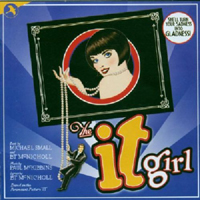 Original Off-Broadway Cast, 2002 (JAY)
Original Off-Broadway Cast, 2002 (JAY)  (3 / 5) Based on It, the 1927 film that starred Clara Bow, The It Girl is a small-scale, 1920s-style musical comedy. It was presented Off-Broadway by the York Theatre Company almost a year before the Broadway opening of Thoroughly Modern Millie, a show it resembles in some respects. Jean Louisa Kelly stars as Betty Lou Spence, a spitfire flapper-type who sets New York aflame with her unique brand of style and sexual appeal. The cast also includes Jonathan Dokuchitz as the object of her affection, Jessica Boevers as the object of his semi-affection, and Stephen DeRosa as the dandy who sets the frantic plot in motion. All of the performers are talented if not exactly bursting with charisma, and the songs provided by composer Paul McKibbins and lyricist B.T. McNicholl are drenched in ’20s rhythms and lively ragtime arrangements. The score’s standout is Boevers’ comic number “A Perfect Plan,” in which she details the peaks and valleys of her troubled love life. A tribute to “Coney Island” is bouncy and tuneful, “Why Not?” is a another cheerfully upbeat entry, and the almost title song “It” is catchy enough to get stuck in your head. — Matthew Murray
(3 / 5) Based on It, the 1927 film that starred Clara Bow, The It Girl is a small-scale, 1920s-style musical comedy. It was presented Off-Broadway by the York Theatre Company almost a year before the Broadway opening of Thoroughly Modern Millie, a show it resembles in some respects. Jean Louisa Kelly stars as Betty Lou Spence, a spitfire flapper-type who sets New York aflame with her unique brand of style and sexual appeal. The cast also includes Jonathan Dokuchitz as the object of her affection, Jessica Boevers as the object of his semi-affection, and Stephen DeRosa as the dandy who sets the frantic plot in motion. All of the performers are talented if not exactly bursting with charisma, and the songs provided by composer Paul McKibbins and lyricist B.T. McNicholl are drenched in ’20s rhythms and lively ragtime arrangements. The score’s standout is Boevers’ comic number “A Perfect Plan,” in which she details the peaks and valleys of her troubled love life. A tribute to “Coney Island” is bouncy and tuneful, “Why Not?” is a another cheerfully upbeat entry, and the almost title song “It” is catchy enough to get stuck in your head. — Matthew Murray
Is There Life After High School?
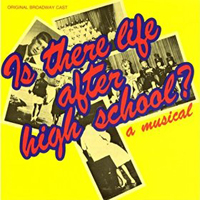 Original Broadway Cast, 1982 (Original Cast Records)
Original Broadway Cast, 1982 (Original Cast Records)  (5 / 5) If this show had opened Off-Broadway instead of on Broadway in 1982, it might have run a lot longer. Is There Life After High School? represents some of the best work of Craig Carnelia, an extraordinarily talented composer-lyricist who later wrote lyrics only to Marvin Hamlisch’s music for the score of Sweet Smell of Success. With a book by Jeffrey Kindley, the show is about the painful, wonderful experience of high school as viewed in retrospect by a group of young adults. The opening (and closing) number, “The Kid Inside,” is a highlight; the song offers spot-on observations about grown-ups who cling to their inner children, and the soaring musical phrase that’s sung to the words “There (s)he goes again” is a real ear worm. Among the show’s cleverest sequences is “Second Thoughts,” in which five people wonder what would have happened if they’d said or done things differently at pivotal moments in high school. Another standout is the beautiful song in which four women recall every detail of their earliest romantic encounters, even though “Nothing Really Happened.” Then there’s the hilarious ”I’m Glad You Didn’t Know Me” (in high school), sung by a couple to each other. (“Picture a phony / Doin’ the pony,” she sings; “Speaking of fears / I had an erection the whole four years,” he admits.) But the most precious gem of the score is probably “Fran and Janie,” a gorgeous tearjerker about two inseparable high school friends encountering each other years later. The estimable performers are Harry Groener, Maureen Silliman, Alma Cuervo, Sandy Faison, Raymond Baker, Cynthia Carle, David Patrick Kelly, Philip Hoffman, and James Widdoes. — Michael Portantiere
(5 / 5) If this show had opened Off-Broadway instead of on Broadway in 1982, it might have run a lot longer. Is There Life After High School? represents some of the best work of Craig Carnelia, an extraordinarily talented composer-lyricist who later wrote lyrics only to Marvin Hamlisch’s music for the score of Sweet Smell of Success. With a book by Jeffrey Kindley, the show is about the painful, wonderful experience of high school as viewed in retrospect by a group of young adults. The opening (and closing) number, “The Kid Inside,” is a highlight; the song offers spot-on observations about grown-ups who cling to their inner children, and the soaring musical phrase that’s sung to the words “There (s)he goes again” is a real ear worm. Among the show’s cleverest sequences is “Second Thoughts,” in which five people wonder what would have happened if they’d said or done things differently at pivotal moments in high school. Another standout is the beautiful song in which four women recall every detail of their earliest romantic encounters, even though “Nothing Really Happened.” Then there’s the hilarious ”I’m Glad You Didn’t Know Me” (in high school), sung by a couple to each other. (“Picture a phony / Doin’ the pony,” she sings; “Speaking of fears / I had an erection the whole four years,” he admits.) But the most precious gem of the score is probably “Fran and Janie,” a gorgeous tearjerker about two inseparable high school friends encountering each other years later. The estimable performers are Harry Groener, Maureen Silliman, Alma Cuervo, Sandy Faison, Raymond Baker, Cynthia Carle, David Patrick Kelly, Philip Hoffman, and James Widdoes. — Michael Portantiere
Irma La Douce
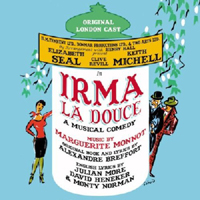 Original London Cast, 1958 (Philips/Sepiano CD)
Original London Cast, 1958 (Philips/Sepiano CD)  (4 / 5) This recording was not released in CD format until 2008. It will come as something of a revelation to those who only know Irma la Douce from the original Broadway cast recording. While the three London stars — Elizabeth Seal, Keith Michell, and Clive Revill — and director Peter Brook were all imported to Broadway, the London recording offers a great deal of dialogue that reveals the story with more clarity than on the subsequent Broadway cast album (see review below). Many of the lyrics are different, and there is a truly charming Act II reprise of “Our Language of Love,” in which Irma expresses her feelings about Nestor while he is in prison. In the ballet, we can hear the prison break, and we learn of Irma’s pregnancy and other plot details. The only disappointment is Seal’s delivery of the title song; she does a much better job on the Broadway recording. Other than that, the London LP captures the essence of a most unusual show, and the three leads are perhaps a little warmer and less slick here than they became by the time the show reached New York. — Jeffrey Dunn
(4 / 5) This recording was not released in CD format until 2008. It will come as something of a revelation to those who only know Irma la Douce from the original Broadway cast recording. While the three London stars — Elizabeth Seal, Keith Michell, and Clive Revill — and director Peter Brook were all imported to Broadway, the London recording offers a great deal of dialogue that reveals the story with more clarity than on the subsequent Broadway cast album (see review below). Many of the lyrics are different, and there is a truly charming Act II reprise of “Our Language of Love,” in which Irma expresses her feelings about Nestor while he is in prison. In the ballet, we can hear the prison break, and we learn of Irma’s pregnancy and other plot details. The only disappointment is Seal’s delivery of the title song; she does a much better job on the Broadway recording. Other than that, the London LP captures the essence of a most unusual show, and the three leads are perhaps a little warmer and less slick here than they became by the time the show reached New York. — Jeffrey Dunn
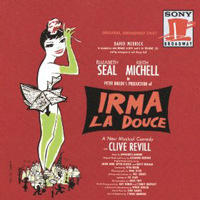 Original Broadway Cast, 1960 (Columbia/Sony)
Original Broadway Cast, 1960 (Columbia/Sony)  (4 / 5) One of very few French musicals to earn success in London and in New York, Irma la Douce went through some changes in each country, but this recording retains enough Gallic charm mixed with Broadway know-how to satisfy all but the most curmudgeonly of FrancophiIes. That’s particularly evident in the orchestrations of André Popp (additional orchestrations by Robert Ginzler, dance music by John Kander), with the obligatory accordion and a stylish xylophone often dominating. The overture is an old-fashioned attention-grabber. The opening number is “Valse Milieu,” in which Clive Revill as Bob-Ie-Hotu — who narrates the story and plays numerous other roles — sets up the plot and defines the French words that are sprinkled throughout the piece: poule for prostitute, mec for pimp, grisbi for money, and so on. The fanciful tale tells how one of Irma’s clients, Nestor, falls so in love with her that he wants to become her only client. The music is by Marguerite Monnot, composer of many songs popularized by Edith Piaf; the original French book and lyrics by Alexandre Breffort were cleverly adapted into English by Julian More, David Heneker, and Monty Norman. London leads Elizabeth Seal, Keith Michell, and Clive Revill also starred in the Broadway production. Seal, who won a Tony Award for her performance, is a singing actress whose personality jumps from a recording. Michell as Nestor has a beefy, full-bodied sound in the love duets, is comedic in “Wreck of a Mec,” and is magnificent in the haunting “From a Prison Cell.” Revill is especially funny in the climactic “But.” The all-male ensemble is excellent in “Sons of France,” “She’s Got the Lot,” and “Christmas Child.” There is also an extended sequence that ends up in an “Arctic Ballet” complete with penguins! It doesn’t make much sense, but the dance music is terrific. In his New York Herald Tribune review of Irma la Douce, Walter Kerr wrote: “If an original cast album is made available in your neighborhood, get it.” Take Mr. Kerr’s advice. — J.D.
(4 / 5) One of very few French musicals to earn success in London and in New York, Irma la Douce went through some changes in each country, but this recording retains enough Gallic charm mixed with Broadway know-how to satisfy all but the most curmudgeonly of FrancophiIes. That’s particularly evident in the orchestrations of André Popp (additional orchestrations by Robert Ginzler, dance music by John Kander), with the obligatory accordion and a stylish xylophone often dominating. The overture is an old-fashioned attention-grabber. The opening number is “Valse Milieu,” in which Clive Revill as Bob-Ie-Hotu — who narrates the story and plays numerous other roles — sets up the plot and defines the French words that are sprinkled throughout the piece: poule for prostitute, mec for pimp, grisbi for money, and so on. The fanciful tale tells how one of Irma’s clients, Nestor, falls so in love with her that he wants to become her only client. The music is by Marguerite Monnot, composer of many songs popularized by Edith Piaf; the original French book and lyrics by Alexandre Breffort were cleverly adapted into English by Julian More, David Heneker, and Monty Norman. London leads Elizabeth Seal, Keith Michell, and Clive Revill also starred in the Broadway production. Seal, who won a Tony Award for her performance, is a singing actress whose personality jumps from a recording. Michell as Nestor has a beefy, full-bodied sound in the love duets, is comedic in “Wreck of a Mec,” and is magnificent in the haunting “From a Prison Cell.” Revill is especially funny in the climactic “But.” The all-male ensemble is excellent in “Sons of France,” “She’s Got the Lot,” and “Christmas Child.” There is also an extended sequence that ends up in an “Arctic Ballet” complete with penguins! It doesn’t make much sense, but the dance music is terrific. In his New York Herald Tribune review of Irma la Douce, Walter Kerr wrote: “If an original cast album is made available in your neighborhood, get it.” Take Mr. Kerr’s advice. — J.D.
Irene
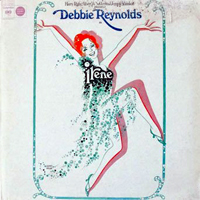 Broadway Cast, 1973 (Columbia/Sony)
Broadway Cast, 1973 (Columbia/Sony)  (4 / 5) Encouraged by the success of the 1971 Broadway revisal of No, No, Nannette, producer Harry Rigby and colleagues reworked and mounted Irene, a musical that had been a hit in 1919 but had hardly ever been performed since the 1930s — even though it included such Harry Tierney-Joseph McCarthy songs as the monster hit “Alice Blue Gown.” The buoyant headliner of the new Irene was Debbie Reynolds, who gave her pluckiest performance since the film version of The Unsinkable Molly Brown and helped turn the show into a hit. Happily, her gutsy portrayal is well preserved on the cast album. Reynolds’ rendition of “The World Must Be Bigger Than an Avenue,” a new song by Wally Harper, is dynamite. Other outstanding moments belong to George S. Irving in a Tony Award-winning performance as “Madame Lucy,” and Patsy Kelly, direct from her Tony-winning triumph in No, No, Nanette, as Irene’s mother. More star presence is provided by Monte Markham as Donald S. Marshall III and Ruth Warrick as his mother. The recording was artfully produced by the great Thomas Z. Shepard at the peak of his expertise. — Gerard Alessandrini
(4 / 5) Encouraged by the success of the 1971 Broadway revisal of No, No, Nannette, producer Harry Rigby and colleagues reworked and mounted Irene, a musical that had been a hit in 1919 but had hardly ever been performed since the 1930s — even though it included such Harry Tierney-Joseph McCarthy songs as the monster hit “Alice Blue Gown.” The buoyant headliner of the new Irene was Debbie Reynolds, who gave her pluckiest performance since the film version of The Unsinkable Molly Brown and helped turn the show into a hit. Happily, her gutsy portrayal is well preserved on the cast album. Reynolds’ rendition of “The World Must Be Bigger Than an Avenue,” a new song by Wally Harper, is dynamite. Other outstanding moments belong to George S. Irving in a Tony Award-winning performance as “Madame Lucy,” and Patsy Kelly, direct from her Tony-winning triumph in No, No, Nanette, as Irene’s mother. More star presence is provided by Monte Markham as Donald S. Marshall III and Ruth Warrick as his mother. The recording was artfully produced by the great Thomas Z. Shepard at the peak of his expertise. — Gerard Alessandrini
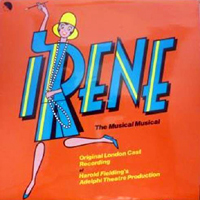 London Cast, 1976 (EMI/no CD)
London Cast, 1976 (EMI/no CD)  (4 / 5) This bouncy, well-performed London Irene stars the excellent Australian performer Julie Anthony. The arrangements and orchestrations are almost identical to those of the Broadway revisal, and they sound bright and crisp as recorded here. Under conductor Ralph Burns’ excellent baton, the chorus numbers are particularly spirited and exciting. As Irene, Anthony shows off a thrilling voice with much gusto, and she can belt out a show-stopper and then turn around and deliver a soft, tender ballad very effectively. The strong supporting cast includes Jon Pertwee, Jessie Evans, and Eric Flynn. As Donald, Flynn does an excellent job with a lovely old song that wasn’t in the Broadway production, “I Can Dream, Can’t I?” Another added treat is the ballad “If Only He Knew,” persuasively rendered by Anthony. This is an unusual London cast album in that the singers sound like authentic American musical theater performers, and the sound quality of the recording is superb. — G.A.
(4 / 5) This bouncy, well-performed London Irene stars the excellent Australian performer Julie Anthony. The arrangements and orchestrations are almost identical to those of the Broadway revisal, and they sound bright and crisp as recorded here. Under conductor Ralph Burns’ excellent baton, the chorus numbers are particularly spirited and exciting. As Irene, Anthony shows off a thrilling voice with much gusto, and she can belt out a show-stopper and then turn around and deliver a soft, tender ballad very effectively. The strong supporting cast includes Jon Pertwee, Jessie Evans, and Eric Flynn. As Donald, Flynn does an excellent job with a lovely old song that wasn’t in the Broadway production, “I Can Dream, Can’t I?” Another added treat is the ballad “If Only He Knew,” persuasively rendered by Anthony. This is an unusual London cast album in that the singers sound like authentic American musical theater performers, and the sound quality of the recording is superb. — G.A.
I Remember Mama
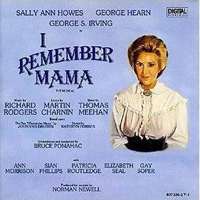 Studio Cast, 1985 (Polygram)
Studio Cast, 1985 (Polygram)  (3 / 5) Richard Rodgers’ musical imagination persisted throughout his life, despite depression, a heart attack, and cancer of the vocal cords. His final show opened just seven months before he died. It was a musical version of I Remember Mama, a play written by John Van Druten and adapted from Mama’s Bank Account, a collection of stories by Kathryn Forbes. The play had also inspired a movie and a television series.) In all its incarnations, the story is about a Norwegian family living in San Francisco around 1910. But, foremost, it’s about Mama, a woman of little education who has a naturally liberal turn of mind. Rodgers wrote the musical with librettist Thomas Meehan and lyricist-director Martin Charnin. Film actress Liv Ullmann, who was not a gifted singer, played the title role. During the out-of-town tryout, producers Alexander Cohen and Hildy Parks brought in a new director, Cy Feuer, and a new lyricist, Raymond Jessel. Amid the chaos of the pre-Broadway tour, Rodgers created six new songs in two weeks. The show opened on Broadway in May 1979 to largely disparaging reviews and closed three months later. Still, Mama proves that even a lower-tier work by Rodgers is superior to almost anyone else’s best effort, and in songs such as “You Could Not Please Me More” and “Time,” the music soars above the pedestrian lyrics. No cast album of the show was made; this studio recording was produced by Norman Newell, with John Yap as executive producer and Theodore S. Chapin as coordinating producer. Parts of it were recorded on either side of the Atlantic to accommodate a dream cast of American and British performers. George Hearn as Papa and George S. Irving as Uncle Chris recreate their Broadway roles; Sally Ann Howes replaces Ullmann as Mama; Ann Morrison plays Katrin, the writer who immortalizes Mama in magazine fiction; Gay Soper is Mama’s benevolent sister; Patricia Routledge is Aunt Jenny; Elizabeth Seal is Aunt Sigrid; and Sian Phillips appears as a British novelist. In the lively “Easy Come, Easy Go” and the acidic “It’s Going to Be Good to Be Gone,” Irving shows off the stuff that made him one of the theater’s great comedic assets. The recording’s high point is the Routledge-Seal duet “A Most Disagreeable Man.” — Charles Wright
(3 / 5) Richard Rodgers’ musical imagination persisted throughout his life, despite depression, a heart attack, and cancer of the vocal cords. His final show opened just seven months before he died. It was a musical version of I Remember Mama, a play written by John Van Druten and adapted from Mama’s Bank Account, a collection of stories by Kathryn Forbes. The play had also inspired a movie and a television series.) In all its incarnations, the story is about a Norwegian family living in San Francisco around 1910. But, foremost, it’s about Mama, a woman of little education who has a naturally liberal turn of mind. Rodgers wrote the musical with librettist Thomas Meehan and lyricist-director Martin Charnin. Film actress Liv Ullmann, who was not a gifted singer, played the title role. During the out-of-town tryout, producers Alexander Cohen and Hildy Parks brought in a new director, Cy Feuer, and a new lyricist, Raymond Jessel. Amid the chaos of the pre-Broadway tour, Rodgers created six new songs in two weeks. The show opened on Broadway in May 1979 to largely disparaging reviews and closed three months later. Still, Mama proves that even a lower-tier work by Rodgers is superior to almost anyone else’s best effort, and in songs such as “You Could Not Please Me More” and “Time,” the music soars above the pedestrian lyrics. No cast album of the show was made; this studio recording was produced by Norman Newell, with John Yap as executive producer and Theodore S. Chapin as coordinating producer. Parts of it were recorded on either side of the Atlantic to accommodate a dream cast of American and British performers. George Hearn as Papa and George S. Irving as Uncle Chris recreate their Broadway roles; Sally Ann Howes replaces Ullmann as Mama; Ann Morrison plays Katrin, the writer who immortalizes Mama in magazine fiction; Gay Soper is Mama’s benevolent sister; Patricia Routledge is Aunt Jenny; Elizabeth Seal is Aunt Sigrid; and Sian Phillips appears as a British novelist. In the lively “Easy Come, Easy Go” and the acidic “It’s Going to Be Good to Be Gone,” Irving shows off the stuff that made him one of the theater’s great comedic assets. The recording’s high point is the Routledge-Seal duet “A Most Disagreeable Man.” — Charles Wright

